Text
I’m not okay…and neither are you
July 13, 2013
I was excitedly preparing for the start of my first semester at University. It was also the day George Zimmerman was acquitted of all charges in the murder of Trayvon Martin. My then-nascent Twitter timeline was rife with anger from black celebrities while I was completely oblivious to the terrible events of the 17 months prior; this was the first time I was confronted with the glaring gap in my racial education.
Look, I spent the first 18 years of my life in Nigeria, where everyone looked like me. Sure, I knew about racism but I hadn’t experienced it. I didn’t understand it. I wanted to. I had to.
I’m in a lot of pain right now.
There’s no way to sugarcoat it; there’s no literary beautification. The truth of my reality is that I have been in visceral pain for the past few days. Black death has, in the 7 years since that George Zimmerman verdict, risen exponentially and the black bodies have continued to pile up with the same care and consideration shown to trash thrown off the side of a bridge.
Perhaps as a way to safeguard our mental health, we had settled into a routine that followed each senseless killing — online anger, hashtags with the victims’ names, short, unsustainable real-world demonstrations; then rinse and repeat for the next murder. This routine helped me, and I’m sure many others, avoid the full range of heartbreaking emotions associated with each killing.
However, something different happened on the 25th of May 2020. I hate that I have to refer to the senseless murder of a human being as a ‘watershed moment’, but unfortunately that is what the killing of George Floyd has become.
Sustained protests have erupted in all 50 American states and in several cities around the world. Black people the world over have shown a solidarity that could never have been foreseen. This is of course, not in response to just the killing of George Floyd. Hours before the news of his death, we all saw the video of a white woman calling the police and asking for their presence while falsely accusing a black man, Christian Cooper. Every black person watching that video knew that eight out of ten times that video starts with the cops already present and more likely than not, has a more tragic end. Ahmaud Arbery was killed while jogging in February, Breonna Taylor was, in March, shot 8 times in her bed by the police after they barged into the wrong house. Adama Traoré, who was the symbol for last week’s French protests, died in police custody in Paris, in 2016. Belly Mujinga died from COVID-19 a few weeks after being spat at while working at Victoria Station, not to mention the scores of other black civilians killed by police or alt-right violence in America in recent years. So yes, black people have a lot to be angry about. We have decided that enough is enough and after begging for our lives to matter, we are ready to demand that they do.
If all these protests were to simultaneously stop tomorrow, I would be very proud of what I have witnessed. There have been notable direct effects of the protests- Breonna Taylor’s death would not have been reopened by the FBI if we didn’t put the national spotlight on it. Neither the arrests of the other 3 police officers involved in George Floyd’s death nor the raising of the charge for the main culprit (from third-degree murder to second degree) would have been possible without the worldwide protests. These are tangible successes and ones we should be proud of.
However, what I hold highest about these protests is that they have managed to stimulate the passion of the entire black population. People are awake now. Those who were already awake are tired of keeping quiet. Everyone is angry and thank God because I’ve been waiting to get angry.
The past couple of weeks have been very tough. Not only because of the mounting deaths of black people in America, but also, back in Nigeria, anarchy remains dominant. Tina Ezekwe was a 17-year-old student murdered by a policeman on the 26th of May, for the crime of walking back home. Gender violence protests have also broken out across the country after Farishina, a 12-year-old girl was raped by eleven(!!) men and Uwavera Omozuwa, a university student was raped and left to die in a church where she had gone to study. Women have taken to the streets and the internet to protest these injustices.
They continue to rail against the society that educates its sons that they have an entitlement to women’s bodies, against men who refuse to hear and understand the importance of “No”, against a police force that is more likely to support the rapist than the victim and against the men who encourage and protect, either directly or indirectly, their rapist friends. Many women have mustered the courage to recount their abuse stories and call out their own rapists. The courage of these women knows no bounds and it is a courage we should never ask of another human being.
These Nigerian women, along with the black people in Minneapolis and subsequently all over the world, have ignited a fuse that we are determined to keep burning. We are here now and this time, we aren’t backing down.
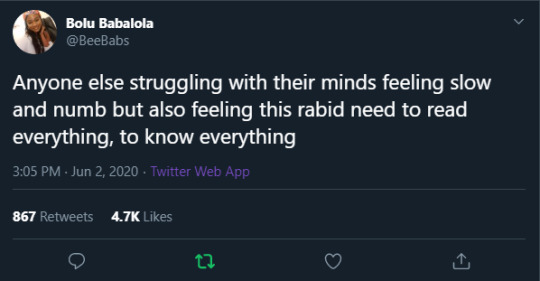
The drawback to protesting is the toll it takes on us. I’m not talking about the physical one (drink water, you’ll be fine), but the emotional and mental one. I’ve found it impossible to get through my work in the past week. Although I am tired all day, I click on every link and hyperlink, eager to read all I can.
Luckily, I came across the above tweet which led me to speak to a few of my black friends. I quickly realised that this wasn’t some “lazy period” I was experiencing, this was a direct result of the pain we were all collectively feeling. It was impossible, almost farcical, for us to believe we could continue with our regularly scheduled programming after watching a man die live on camera and then witnessing the incineration of a country as a result.
So, yeah, we are not okay and I wouldn’t expect us to be. If you take anything from this well-edited rant, it should be for you to take care of yourself. Please, I beg each and every one of you, prioritise your mental health. There is so much going on out there that you need to be fully charged to face. So, if you have to unplug and do a news purge for a day or so, do that. If you have a happy place that you can get to via music or TV, please do that. Whatever it may be, do what you can to take care of yourself. It is easy to feel that your immediate well-being pales in comparison to the lives lost or those out there protesting but it doesn’t. Yes, we need you, but we need you at your best. We do not want to lose more people in this fight. So, please rest and come back when you are at your fighting shape.
See you back on the frontlines.
Breonna Taylor-
1.https://msha.ke/30flirtyfilm/
Belly Mujinga-
1.https://www.change.org/p/govia-thameslink-justice-for-belly-mujinga-justiceforbellymujinga?utm_content=cl_sharecopy_22128388_en-
Uwavera Omozuwa-
1. https://protectnigerianwomen.carrd.co/
2. https://www.change.org/p/nigerian-police-force-justiceforuwa?
3. https://www.change.org/p/nigeria-police-force-justice-for-young-uwa
4. https://www.change.org/p/make-consent-comprehensive-sex-education-compulsory-in-all-educational-institutions?
Tina Ezekwe
1) https://twitter.com/NativeMag/status/1268936620780277760
2) https://justicefortinafund.com/
STAND TO END RAPE
https://paystack.com/pay/ster
BLACK LIVES MATTER
https://blacklivesmatters.carrd.co/#
Bankole Imoukhuede
@banky_I
#blacklivesmatter#blackmindsmatter#sexual assaul#george floyd#ahmaud aubrey#breonna taylor#adama traore#bellly mujinga#stand to end rape#trayvon martin
3 notes
·
View notes
Text
Dammit, there I go doubting myself again
Quite often, I catch myself replaying the various crossroad decisions that led to me choosing my current, creative path over more traditional job prospects. I have regularly found comfort in the belief that not only was this the right choice, but it was also the only choice.
You couldn’t have done anything else.
However, recently, I’ve found myself second-guessing a lot of those decisions my motivations behind them and naturally, their eventual results.
Doubt has, unfortunately, become a familiar foe. It has managed to creep in and settle in a very hard to reach corner of my psyche. Like an infuriating itch nestled at the centre of my back, I can’t seem to reach it, as hard as I may try. Every failed attempt just enables it to grow louder.
Should you have chosen this path? Was it worth it?
It’s not too late to do the normal thing.
Look at how well your mates are doing!
At first, I regarded it as simply outgrowing my youthful naivete- I had always appreciated how difficult it could be and maybe now I was finally witnessing it. However, as it became louder and more insidious, I quickly realised that this was more than just disillusionment.
I am lucky enough to be surrounded by several brilliant people and whenever a friend on the earlier mentioned traditional path marked a victory, I wholeheartedly enjoyed their success. I was unreservedly happy for them; I basked in their successes as if they were mine. Whenever my mind started to drift into making comparisons, I would reassure myself with trite expressions like “we are on different journeys” or “everyone’s race is different”. Whether I believed them or not didn’t matter, they did the job and if all else failed, I reminded myself that I could always get free meals from them.
However, there was something different with the successes of my creative friends. This was where the itch found its voice. I was still unabashedly happy for them and I took my role as their biggest cheerleader very seriously. But here, my sayings couldn’t placate me anymore. Despite whatever differences in our starting points, we were on the same journey. We were in the same race; our goal was the same. So, why was I not any closer to achieving said goal?
There was this intriguing battle going on within me- a rare occurrence where two very different things were somehow coexisting. I was able to be happy for them and I gleefully spoke of their brilliance to anyone that would (or wouldn’t) listen. However, unlike with my other friends, I couldn’t bring myself to celebrate their wins as my own. It made me feel like a fraud- if I was good enough, then I wouldn’t have to celebrate their wins as my own because I would be celebrating my own wins.
Are you good enough?
You aren’t good enough.
It was here that I recognised that this feeling, this voice nestled in me was a bit more than just a harmless itch. It had slowly assumed a form I could recognise, one I could name. Impostor Syndrome.
Impostor syndrome, coined by two psychologists, Pauline Rose Clance and Suzanne Imes in a 1978 paper, is a psychological state where one doubts the validity of their accomplishments and status. They have an internalised fear of being exposed as a fraud because they believe they aren’t as good as everyone thinks they are and they only have their accomplishments by luck. Clance would even go on to create a test which categorises how deeply the syndrome/phenomenon affects an individual’s life. You can take that test here and I urge everyone to do so.
I’ve come to find that impostor syndrome is an equal opportunity offender. It’s a beast that cuts across all disciplines, practitioners and interests. I understand it as a universal feeling experienced by most people doing something they care about.
Interestingly, I try to see that as a positive - You fear because you care!
Similar to any other mental occurrence, recognising and naming the problem is only the first step. The fact that I recognised it as Impostor Syndrome or that I understood the fallacy surrounding the syndrome, didn’t make it seem any less frightening or feel any less real. After all, the doubt had been able to grow for a reason. It was able to spread within me because I was truly afraid of it.
I was afraid that it was right, that I wasn’t good enough.
I was afraid that the people who thought similarly would soon be very vocal.
I was afraid that those who had supported me so far would realise that I was a fraud and turn on me.
Well, quite frankly, fuck them.
It was now on me to decide to no longer live in that fear. The execution would not be as instant as the decision, but I had to be resolute. I knew how important the execution was. I knew I had to take these required steps in order to be comfortable enough to start accruing my own wins.
Like most mental and emotional occurrences, dealing with self-doubt and impostor syndrome is a continuous process. It is not something that ever completely goes away. You just have to keep reminding yourself that you belong at the table, in that room. Like the itch, you can never, really, get to it fully. What you can and must do is never give up.
It’s a continuous battle that is made even more difficult if you are a racial or gender minority. But it’s a battle we have to wage. We are already excluded from those rooms so the last thing we need hampering any potential success is self-doubt. In the words of former First Lady Michelle Obama, the people in those rooms are “not that smart”, so if you are not yet in the room, work like hell to get in. If you are in, keep reminding yourself that you deserve to be there, because there are people plotting to take your spot if you give them the opening. More often than not, they are playing with a deck more stacked than yours so don’t let self-doubt disqualify you before the game has even begun.
I wish I could provide a step-by-step solution to anyone reading this who empathises with this situation. Unfortunately, this blog has never pretended to be one to provide the important answers. In fact, it’s probably a fair assessment that I put forward more questions than answers.
What I do know though, is that nothing can be achieved without standing tall, staring in the face of the doubt and walking through it. Without that courage and determination to face the demons, all the answers in the world won’t be worth the paper they are printed on. Irrespective of whatever other solutions we may encounter in the future, locating and embracing our inner strength is the only way we can expect to overcome our self-created obstacles. Luckily, we all have that courage within us. It might be more difficult for some to access and others may not even believe that it’s there but it is.
I expected that over the weeks (months) it would take me to finish this piece, I would cry at my laptop at least once and honestly, it was fine. Granted, I knew it was coming so I was over-prepared but that rare cry meant something. It meant I was still invested in this, the nagging doubt hiding in the corner hadn’t won yet, I’m still doing what I love and still willing to fight for it.
So, it means, I’ll fight again tomorrow.
Bankole Imoukhuede,
@banky_I
0 notes
Text
I don’t want to wait for my dad to die, to cry.
If my dad died today, what would I say? What would I wish I had said?
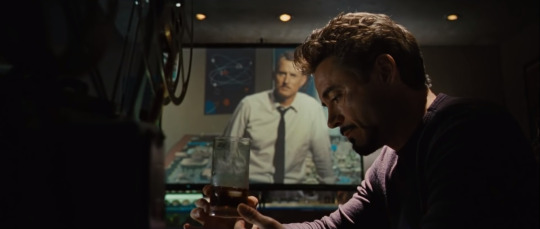
Sat in the darkness of my movie theatre, as Alan Silvestri’s sombre score begins to swell, I can feel my neighbours on the brink of breaking down- some had already been weeping for a solid five minutes. Then, as if to break those of us still holding it together, Tony Stark’s pre-recorded hologram gets up from his seat, stares directly at his wife and daughter and proclaims “I love you 3000”.
All I could think about at this point was how far he (Tony not “Iron Man”) had come and how rich that journey had been. As if to buttress my point, a minute later, Tony’s memorial floats across the lake, adorned with his first arc reactor- a call back to his first appearance in this sprawling cinematic universe. When Pepper Potts (Gwyneth Paltrow) had gifted it to him in Iron Man 1, she had inscribed on it “Proof that Tony Stark has a heart”.
Boy, did he!
In the lead up to last year’s Avengers: Infinity War, I discussed the paternal relationships portrayed in the Marvel Cinematic Universe (coincidentally, Infinity War is a film in which a father throws the daughter he loves off a cliff, to her death. Father issues? What Father issues?). Some criticisms levied against that piece were that it was too long and bloated. So, my response? A sequel, naturally.
With that article, I wanted to highlight that we all have our different parental issues- even superheroes have them! These issues were not peculiar to us individually. Naturally, we might feel this way but they were so commonplace in fact, that the biggest franchise in the world was examining them in their billion-dollar entries.
What I had not thought about though, was what was next? I had not fully considered what happens after you acknowledge your issues. What do you do next, is it important to do anything, can I (please) just revert to auto-pilot? In a cruel twist of art imitating life, I had failed to consider the aftermath, because I had not yet reached that point of “after”. How could I write about a journey I had not yet taken?
Which brings us to here and now. During (yes, during) Avengers: Endgame, I began to see just how unfinished my writing was and as I continued to mull the themes over, this spiritual sequel began to take shape. I also noticed that just as Marvel had posed the question for my first article, they had also provided the answer for my follow up. So, because I am nothing if not consistent (read: one-dimensional), Tony Stark (Robert Downey Jr.) will once again serve, one last time, as both muse and avatar as I discuss the Marvel Cinematic Universe’s (MCU) portrayal of healing during the aftermath.
Healing can only begin when you confront your shit.
Deflection is easy. Deflection is safe. However, the true “after”- the needed healing, can only begin when we’ve been able to acknowledge and confront the issues.
Tony Stark had a very tumultuous relationship with his father. Slowly, over the course of the earlier MCU instalments, we are given an idea of how this relationship grew from unrequited admiration/attention in Tony’s adolescence to estrangement and eventual resentment. After spending his childhood with a distant father and being “shipped off” to boarding school at the earliest convenience, Tony has no reason to believe that his father even likes him, much less loves or respects. This lack (and subconscious search) of validation would end up guiding Tony’s actions in his adulthood, both the applaudable and the self-destructive.
In Iron Man 2, Nick Fury (Samuel L. Jackson) gives Tony some of his father’s research which he had left specifically for him. It is in those research documents that he finally finds the validation he had been searching for his entire life- that direct vote of confidence from his father. In this direct-to-video address, Howard Stark (John Slattery) expresses belief in his son’s untapped potential while also, subtly, explaining the reasoning behind some of his actions.
youtube
This is a rare feat. Many aren’t afforded that kind of insight into their parent’s thinking while they are alive much less decades after they’ve died. Tony was able to have a real confrontation with his past and as a result, the issues it had borne.
As a side note, it is important to address that while it may be the method being discussed, this “direct confrontation” is not the only way to begin our healing. What is universal though, is the domino effect any meaningful confrontation can have. In Tony’s case, the closure this brings finally helps him get rid of the chip on his shoulder and kickstart his own healing process- a process we see begin halfway through Iron Man 2 and finally come to a (satisfying) conclusion in Avengers: Endgame.
Much like his tech, Tony Stark was always evolving, improving. From that moment in the cave in Iron Man 1 when he decided to be a better person, he was constantly on a path of self- improvement and in Iron Man 2, his relationship with his father was added to the checklist. With the earlier detailed confrontation, he was provided with some much-needed clarity. It was almost as if, immediately, in the back of his head, the emotional cogs began to move smoothly after years of disharmony. With the chip off his shoulder, things seemed easier. Slowly that paternal toxicity in him began to dissipate. He was no longer relying on the crutches he once had, and the healing truly began.
What we would then witness was that, with every succeeding movie, a more “fatherly” side of Tony began to appear. His healing process wasn’t explicit or in your face, he just slowly became better.
Tony, of course, spends a large portion of 2013’s Iron Man 3 with a 12-year-old kid (Ty Simpkins) in a father-son, buddy cop relationship but it wasn’t until he recruited a teenage Peter Parker (Tom Holland) in Captain America: Civil War that we would see just how far he had come. Crucially, this doesn’t happen until Tony reaches a viable, satisfactory, conclusion to his arc with his father.
Ready or not, you have to move on with your life.
Time isn’t going to wait for you. Eventually, life is going to catch up with you. So, you need to start the healing process as soon as you can because it’s a life-long mission.
Tony Stark’s introduction in 2016’s Captain America: Civil War is during an augmented reality session. This particular session is set on the final day he sees his parents, the day they die. Towards the end, his mum breaks the fourth wall of the memory and implores young Tony to say something to his father because it’s the last time he will see them. He doesn’t argue or deflect, he isn’t sarcastic, instead he says to Howard, honestly, “I love you, Dad” and informs his mother that he knows “he (his father) did the best he could”.
Sure, Tony engineered the situation, but that’s more growth than most of us experience. The silent healing at the back of his psyche had now got Tony to a position where he was comfortable telling his father he loved him and acknowledging that he probably did the best he could, mistakes and all. He didn’t say this because he felt it was expected of him but rather because he had got to a point where he truly believed it. Yes, his (real) father couldn’t hear him but he could say it. He could make this admission to himself.
For his healing, this was a conclusion he needed to reach before being able to successfully move on with his life. In the larger picture of the MCU’s story, this was an admission he had to make to be effective in the two very important relationships that were about to occur in his life- the first being with a certain precocious teenager from Queens.
youtube
After enlisting Peter Parker, Tony assumes guardianship over him. Peter, also trying to fill that Uncle Ben shaped hole in his life is eager to impress “Mr Stark” and receive his validation- not unlike a young Tony trying to impress his father. Having done the necessary healing, Tony is now in a place where he can be that father figure to Peter. He now understands not only, how it feels to be the son of a distant father but also the reasoning behind the actions that might have made his father come across as distant.
Knowing that life is never going to wait for us, it is incumbent on us to be serious about our healing. Because without it, we’ll just step back into life, into relationships, with the same hurt, ignorance, pride that will only serve to continue the wheel. Like Tony in the cave, we need to make a decision to do better, be better.
Don’t wait, cry now.
What was most indicative of Tony’s healing, was his self-awareness. At one point during an argument with Peter, Tony catches himself and mutters “Gosh, I sound just like my dad”. It’s the type of self-awareness that only comes as a result of doing the healing work.
Like Tony, many of us take too long to confront the complexities in our parental relationships. We now find, that at this late stage, we are wistful for the relationship that could have been. We mourn the vulnerability that was skipped on, the laughs that were not shared, the emotions that were not laid bare, the cries that never were.
This is why Tony’s augmented reality session was always important. It was his way of creating a model reality where he confronted his issues in time to have a good relationship with his dad, if only for just a second. It provided him with the opportunity to finally let go of his baggage and honestly and wholeheartedly appreciate his father, knowing “he did the best he could”.
With the results of his private healing in tow, he is now able to be a good surrogate father to Peter and real father to Morgan (Alexandra Rabe). We see that, to Morgan, Tony is everything he wished his dad was to him- affectionate, understanding, present. It may seem obvious that he would be the father he wished his father was but as we tend to see, that is rarely the case. What is more common though, is a continuous perpetuation of the cycle. Of course, it isn’t always intentional but without proper attention to the emotional scars, hurt kids become hurt adults who, via releasing their pent-up pain, raise hurt kids. Spokes on a wheel.
Perhaps because of how perfect and apparent a conclusion the AR session was to the arc, I found the time travel sequence in Avengers: Endgame very surprising and equally impactful. Tony, after all he’s been through, all he’s learnt, is now face to face with his father. This isn’t a home video or a billion-dollar augmented reality experiment, it’s the real deal.
The Tony from a decade prior might have been sarcastic, snarky, deflective. But not this one. Not this Tony who knows his dad’s real feelings and motivations. Not this Tony who’s done all his healing work, who’s lost his adopted son and fathered a daughter. No, this Tony is honest, raw, emotional, thankful even. He is appreciative of the life he’s had. He understands what his father is going through and will go through. He is (finally) at peace with the issues that arose because of both he and his father’s insecurities, and willingly accepts all he has become because of them.
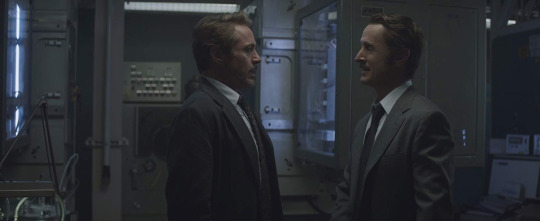
And is that not the goal? To be able to reach a point where we can now look into their eyes and understand where they are coming from. To be at peace with all that we are and all that they were/are. To be able to finally accept and understand the importance of all the rough edges in creating us as rounded human beings. It should be the aim but like any other desired goal it requires work to get there. Sometimes even, unpleasant work.
As Tony exemplified, everyone (even seemingly irredeemable billionaire, playboy, philanthropists) deserves to confront and conquer their issues and mend a tense relationship. While it will be tough, I write this with the hope that I have inspired someone to begin their own healing process. While yours is most likely not going to involve a billion-dollar AR experiment or time travel, you have the power to begin today.
It is admittedly easier for some than it is for others but like every other thing, it begins with starting. So, pick up a phone, send an e-mail, book an appointment or if you want, just start by yourself, in your head. Your confrontation can take any and many forms and I am ill-equipped to tell you what is best for you. There’s no manual on how to do it, what I have learnt though, is that the only important thing is that you start.
youtube
“I thought my dad was tough on me, but now looking back, I just remember the good stuff”
-Tony Stark, Avengers: Endgame
Here’s to us, eventually, remembering only the good stuff.
Bankole Imoukhuede
@banky_I
#tony stark#avengers endgame#iron man#howard stark#robert downey jr#i love you 3000#dads#spiderman#peter parker#tom holland#morgan stark#avengers
2 notes
·
View notes
Text
Earth’s Mightiest Heroes: Steve Rogers
As nationalism continues to rear its head out of the shadows, Steve Rogers paints the image of the patriot we all need to be.
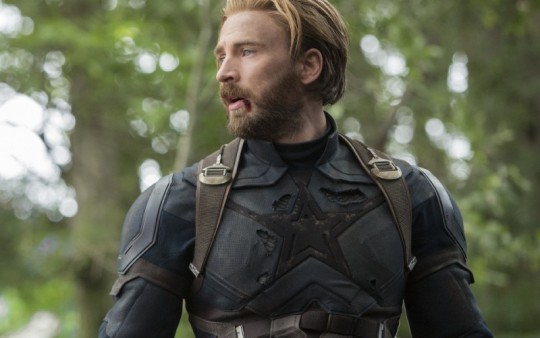
“The price of freedom is high, always has been but it’s a price I’m willing to pay. If I’m the only one, then so be it but I’m willing to bet I’m not.” - Steve Rogers, Captain America: The Winter Soldier.
The world is very strange right now. In the midst of Pamela Anderson defending Julian Assange, measles making a comeback nobody asked for, somehow, Nazis seem to be back in vogue. As weird as it may seem, the very worst parts of Nationalism have been on somewhat of a reunion tour. Even weirder still, people are singing along to some of its greatest hits. Spearheaded by Brexit and 45’s 2016 Presidential win, nationalist ideological policies have risen to the highest forms of power in places like Hungary, India, Italy and Austria with many other traditionally center-right parties adopting more nationalist policies and ideologies.
Cut off one head and two more take its place.
So, why am I talking about Nationalism? Well, in the lead up to Avengers: Endgame, I’ve been thinking a lot about what Captain America means to me and more frequently about the quote at the top of this piece.
Steve Rogers: Captain America
“Captain America” was created in 1941 by Joe Simon and Jack Kirby, two poor, often bullied Jewish kids. He was created as the superhero personification of those ideals society should strive for- Liberty, Freedom, Justice. He was the hero to stand up for the little guy. Of course, the “little guy” at the time were members of Simon and Kirby’s Jewish heritage.
Cap’s desire to stand up for what was right is best exemplified by the image of him punching Hitler on the cover of his first comic (March 1941). A cover which was designed to and succeeded in making a huge impact, not least because America was still 9 months away from joining the war.
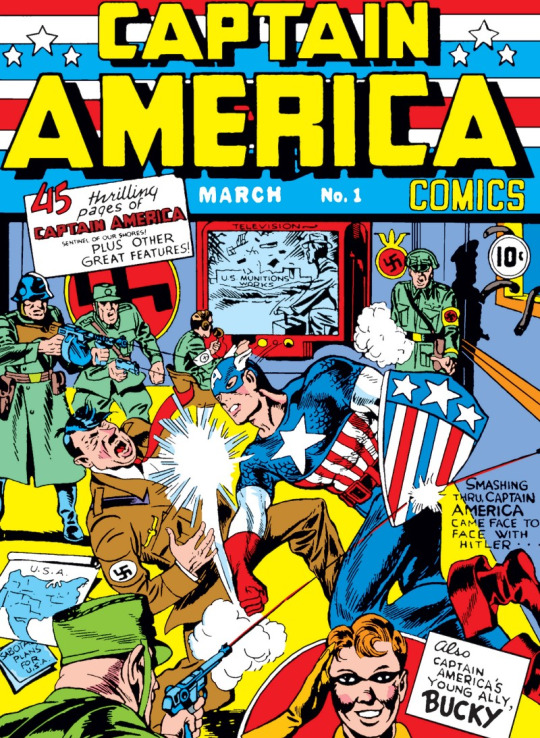
Captain America- The Propagandist
A common criticism levied against the Captain America character is that he is merely American propaganda. It is not difficult to understand why anyone would hold this view, he literally has “America” in his name. He is also fully draped in the American flag with a big and bold “A” on his helmet. The man isn’t winning any stealth competitions. However, while I can understand the propaganda criticism, it has always seemed a bit half-baked and myopic to me.
Admittedly, at his creation, Captain America was unabashedly a propaganda machine. But, that was okay at the time! America was on the right side of that war. It wasn’t a bad thing for him to be the mouthpiece of a downtrodden class like the Jewish Americans. The propaganda he was representing was objectively good propaganda.
Once the war was over, however, and with the Cold War not really providing much action material for comics, the character began to stall. He was becoming stale.
After being discontinued for several years, Stan Lee brought him back in 1964- his story having been retconned to explain that he had been frozen in ice since before the end of the war. He was still the square-jawed boy scout with those aspirational ideals but he was now, in addition, a man literally out of time. How did he reconcile what he believed to be right and just with the actions of his current Government? All of a sudden, this was a new, more interesting character. This masterstroke by Stan Lee led to a dynamism in the character that many future writers would successfully exploit and which would help the Russo Brothers, their writers and of course, Chris Evans, create the best iteration of the character.
Steve Rogers- The Patriot
Coming out of the ice, Steve Rogers was now in a position where his, admittedly, romantic ideals and belief in people were coming into constant conflict with the thoughts and actions of those entrusted to lead his country, those he was pledged to serve. What he staunchly believed to be just and fair was not what his beloved country and indeed wider international community was practising. How could he navigate this conflict?
But first, quickly, Chris Evans
When the casting of Chris Evans was announced, there was a general sense of, “huh? HIM?”. It was confusing that Marvel had tapped the guy that played Johnny Storm and was in those mediocre rom-coms to portray this deeply historical character. “What were they thinking?”, everyone collectively thought. We would quickly realise that yeah, Chris Evans had a good grip on this whole acting thing and that he was the perfect person to embody Captain America. However, as it turned out, the scepticism wasn’t only confined to the fans.
Chris Evans has openly spoken about his hesitancy to take up Marvel’s offer to play Cap. Sure, there was his well-documented fight with anxiety but as he recalled in a 2019 interview with The Hollywood Reporter, he didn’t really see how he could get audiences to connect with a character like Captain America.
“There’s no real darkness to him. How do I make this guy someone you want to watch? I don’t get jokes. I’m not Wolverine. I don’t have dead parents, like Batman. I’m just, like, ‘Hi, I’ll walk your dog. I’ll help you move.’”
The Russo Brothers, co-directors of Captain America: The Winter Soldier, Captain America: Civil War, Avengers: Infinity War & Avengers: Endgame, have also spoken about a similar fear they had that they couldn’t make Cap relatable or interesting to audiences, having never really been fans of the character. This objectivity perhaps, helped them, Chris Evans and their writers, Christopher Markus & Stephen McFeely (Captain America: The First Avenger, Captain America: The Winter Soldier. Captain America: Civil War. Avengers: Infinity war & Avengers: Endgame), somehow mould Cap into a constantly relevant character.
Captain America’s reinvention, and coincidentally, his best moments have always come as a result of his ideals clashing with the nation’s. The first major one came in the wake of the Watergate scandal (back then having a President so flagrantly undermine the rule of law was a very big shock to Steve Rogers). This scandal would inspire the 1974 “Secret Empire” storyline. Another major turning point was the passing of the Patriot Act in response to the 9/11 bombings. This would inspire the pivotal “Civil War” storyline.
On screen, in the Marvel Cinematic Universe (MCU), these moments have mainly come in Captain America: The Winter Soldier and Captain America: Civil War.
“You cannot have a character called Captain America without examining the politics of what that means, especially in this day and age” - Joe Russo
The Winter Soldier is a pivotal movie for both the MCU and the perception and understanding of Cap as a character. Coincidentally, at a time when most Americans were growing in their distrust and paranoia of the Government here was this superhero literally named “Captain America” going through very similar emotions.
Cap finds out that SHIELD is in the final stages of a project appropriately named “Project INSIGHT” (because that’s not nefarious at all). The aim of this project was to help SHIELD “neutralise a lot of threats before they happen” by listening in and monitoring everyone via their phone calls, social media posts etc. so the accompanying algorithm could preemptively decide who was a security threat.
Of course, at the time of the movie’s release, Americans, and the world had only recently learnt about the Obama administration’s terrorist kill list and had even more recently learnt from Edward Snowden that their Government was most likely listening to their phone calls. The movie’s real-world relevancy, though entirely coincidental was incredibly eery.
SHIELD and the World Security Council believed that the safety of the citizens and the strength of the organisation/nation were the most important things- it didn’t matter what other liberties you had to cross to achieve that.
Steve disagreed.
He believed that while the safety of the individual was highly important, the paramount thing was the citizens’ liberty: their freedom.
“It’s not unpatriotic to denounce an injustice committed on our behalf, perhaps it’s the most patriotic thing we can do.”- E.A Bucchianeri, Brushstrokes of a Gadfly
Steve is at a moral and philosophical crossroads. He now has knowledge of the actions of his superiors and these are actions he is categorically against. While he may accept that the intentions were good, he does not see the end result as being nearly as good. “This isn’t freedom, it’s fear”. So, he chooses to stand up for what he believes in, irrespective of who he may have to stand against.
He places the liberty, wishes and lives of (all) individuals over that of the country. He is not blinded by his love and service for the country, nor is he willing to take questionable orders just because they come from an authority he is meant to respect and follow. If anything, the surprise reveal that HYDRA has infiltrated the highest levels of SHIELD and is the real mastermind behind “INSIGHT” only helps to prove his point that nothing gives Government/Governing bodies the moral or philosophical high ground to encroach on the rights of its citizens in such a monumental way.
Of course, Steve Rogers’ rebellious arc comes to a natural conclusion in Captain America: Civil War when he refuses to sign the UN’s accords that require all superheroes to register with the United Nations and only act when instructed by the UN Security Council.
The paranoia of Government from 2014 had now grown into a large distrust and a belief in the Government’s ineptitude, again mirroring real life feelings (Brexit and 45’s electoral win were only a few months away). This distrust leads to Cap’s refusal to sign the Accords. Yes, he accepts that the UN Security Council is not a Government of a country or SHIELD or HYDRA but it is still “run by people with agendas and agendas change”.
He would rather stand up for each individual’s (in this case, powered people) liberty and right to choose what they do with their powers rather than the Government keeping a registry of these people and using them as their personal watchdogs.
This signified completion of his arc, from the “company man” who followed orders irrespective of who was running the company, to believing and advocating for the self over the nation. He went from the literal personification of America and this big propaganda machine to this defiant “rebel” who advocated for the individual over the country. Importantly, this was not because he had fallen out of love or respect for the country but it was this love that had influenced his decisions. He believed that these policies were wrong and harming the thing he was meant to be patriotic to- the people. So, as a true patriot, he sought to fix this even though it meant going against the country.
“My country, right or wrong; if right, to be kept right; and if wrong, to be set right.”- Carl Schurz
Nationalism, has at different points in history, been an effective unifying tool, especially in wartime. However, nowadays, the most abhorrent facets of the ideology have become its most recognisable calling card with its supporters emphasizing that they are only “patriots”- they just want what’s best for their great country. I am not going to analyse and deconstruct the principle of nationalism and its policies e.g immigration, mostly because many smarter people than I have already done that.
What is important to note, however, is the central thesis of nationalism, as described by George Orwell, “(nationalism) is the habit of identifying oneself with a single nation or other unit, placing it beyond good and evil and recognising no other duty than that of advancing its interests.” Patriotism, on the other hand, is a devotion to the liberties and freedoms of the people that constitute this state. The belief that the people are what matters most and that those in charge can be wrong and when they are, should be challenged. In which case, patriotism, true patriotism could be the solution to the evils of nationalism.
This is why I chose to speak about Steve Rogers’ patriotism. Despite the consequences, he chose to challenge the policies of his country/governing body because he saw them as harmful to large groups of the populace. His allegiance was to people and their liberties, not the government.
Captain America is going to represent different things to different people. He is not going to be everyone’s favourite Avenger. There is, however, one thing we should all learn from Cap, especially Chris Evans’ run as Cap- the strength to be unwavering in our own senses of morality and decency. There is a point where constant compromising becomes an issue in of itself.
In the words of Peggy Carter (probably the only person that could match Steve Rogers’ old fashioned, romantic sense of morality), “compromise where you can. But where you can’t, don’t. Even if everyone is telling you that something wrong is something right, even if the whole world is telling you to move it is your duty to plant yourself like a tree and tell them ‘No, you move’”.
CUT FOR TIME
Chris Evans really is the perfect Captain America and honestly, that’s a whole other article that I’ve been wanting to write for a long time (I have drafts). While Robert Downey Jr has, over the years, masterfully created a version of Tony Stark perfect for the here and now, Chris literally seems to have become Steve Rogers and has imbued his performances with the core essence of what this character has been from the very first pages of his first book.
Additionally, over time, both he and the character have slowly meshed into one. He has definitely learnt the right things from Steve Rogers. Whether, it’s his constant, humorous, takedowns of 45 and his cohorts on Twitter, his random gentlemanly acts (that really shouldn’t be a big deal but are sadly not as common anymore) or taking an active role in politics, he ever so often reminds us that he is indeed Captain America.
The rebellious side of Steve Rogers didn’t suddenly come out in Captain America: The Winter Soldier. While always a dutiful soldier, he was never really a blind follower. In Captain America: The First Avenger, tired of being the Government’s ineffectual propaganda show monkey, he disobeys a direct order and goes on a covert mission to help rescue captured prisoners of war.

I also love the portrayal of Steve’s flaws in the MCU, especially in Civil War. A lot of people, understandably, have issues with his actions regarding Bucky and Tony in that movie. I like that the movie doesn’t try to make excuses for his actions, it merely explains them and personally, it’s an explanation I understand. I would probably do the same thing if I were in his position.
Speaking of, I had wanted to write a similar article pre- Endgame on Tony Stark- another character I love, especially RDJ as Tony Stark but life got in the way (!) So, please revisit my pre- Infinity War article on the Father-Son dynamic in the MCU, especially with Tony and Howard Stark.
In honour of Endgame, I have *tried* to rank all past 21 MCU movies on my Twitter. Feel free to discuss the list with me (don’t worry, I’m pretty sure you disagree).
Finally, this is my first MCU related post since Stan Lee’s death so please head over to my twitter for what I briefly said about the impact he’s had on my life.
Excelsior!
Bankole Imoukhuede,
@banky_I
#marvel cinematic universe#steve rogers#captain america#avengers endgame#nationalism#patriotism#tony stark#stan lee#jack kirby#joe simon#captain america civil war#captain america the first avenger#captain america the winter soldier#russo brothers#mcu#marvel#film
0 notes
Text
The Winter Binge-List:
All the reasons you need to avoid speaking to your family this holiday season.

It is now certifiably impossible to keep up with the constant barrage of television premieres. 2018, just like years before, provided us with several new releases and I’ve waded through the “Peak TV” landscape, so you don’t have to (you’re welcome, by the way) and come out with the essential binges from this year’s crop of quality television.
I have successfully amassed a wide-ranging variety. Whether you’re looking for a quick personal binge, something longer to keep the family occupied during the holidays or something riveting enough to steer the dining table conversations away from politics, I should, hopefully, have something for everyone.
QUICK BINGES – 6hrs or less
Bodyguard (BBC Iplayer/Netflix)- 6 hrs
Clocking in at 6 hours, this BBC show took the UK by storm over the summer and for good reason. From the inaugural scene in the pilot, the tension levels are set to 11 and quite frankly, it never really lets up.
After thwarting a terrorist attempt, Sergeant David Budd (Richard Madden) is assigned as Protection Command Bodyguard to Home Secretary Julia Montague (Keeley Hawes) whose political views he strongly opposes. Any more information would end up spoiling a densely intricate and exciting plot.
Check it out, if only to see what Richard Madden’s been up to, since he, you know, left that other show.
youtube
Killing Eve- (BBC Iplayer/ Hulu) Just over 5.5 hrs
This spy vs assassin show takes everything you thought you knew about the genre and just tosses it out the window. Anchored by an amazing performance from Sandra Oh and an absolutely incredible, out of this world performance from Jodie Comer, the show manages to combine hilarity, irreverence and intrigue into pure unadulterated, sustained fun for its 5 and a half hours run.
This is one assassin you should be prepared to fall in love with.
youtube
Homecoming- (Amazon Prime) Just over 5hrs
Sam Esmail (creator and director of Mr. Robot) takes his considerable talents over to Amazon to, via linear storytelling and flashbacks, solve a complicated mystery.
Julia Roberts(!) portrays Heidi Bergman, a counsellor at the Homecoming Transitional Support Center. The Homecoming Center is a half-way house for returning veterans. A way to reintegrate them back into society via therapy and job training- because that’s an idea that could never go wrong.
It’s virtually impossible to describe the show in any more detail. Even the episodes’ synopses reveal nothing. Case in point, the synopsis for the premiere episode:
“The Homecoming Transitional Support Center is a safe space for veterans to process their military experience and re-familiarize themselves with civilian life. In a monitored environment.”
That’s really all you get.
youtube
NOT-FOR-FAMILY BINGE
Succession (HBO/ Sky Atlantic)
This is one definitely not fit for the entire family. Adam McKay (The Big Short, Step Brothers) teams up with Jesse Armstrong (writer of Black Mirror’s “The Entire History of You” and Four Lions) to bring this darkly comic take on a media mogul family, not unlike the Murdochs or really, a host of other American families.
Its perfect mix of Family and Business politics results in deeply unsettling, incredibly vulgar drama. It takes a couple of episodes to properly balance its tone and find its feet but once it does, it’s an incredibly exhilarating ride. The writing is great and the performances from the ensemble cast are incredible.
Maybe after you’ve finished it, you can recommend it to your parents.
youtube
NICHE BINGES
Maniac- Just under 6.5hrs
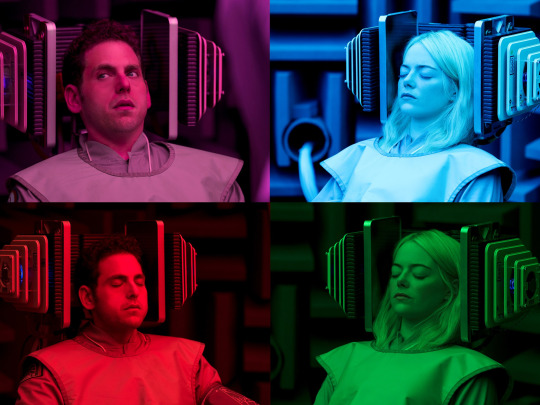
From Cary Joji Fukanaga (Season 1 of True Detective), this Jonah Hill and Emma Stone starrer is an ambitious, genre-bending epic set in a somewhat futuristic New York City. The protagonists, for their own respective reasons, sign up for an experimental (chemical and mechanical) trial designed to bypass talk therapy and cure mental health problems.
Cary Fukanaga, with his masterful eye for visual storytelling, takes this premise and goes ahead to play in so many sandboxes over the show’s 6 and a half hours runtime. The stories and episodes end up ranging from science fiction, to spy stories and fantasy epics, with Jonah Hill and Emma Stone delivering at every turn.
FOOD HANGOVER COMEDIES
Barry (HBO)
This show comes from SNL alum and verified funnyman, Bill Hader and Alec Berg (Silicon Valley, Curb Your Enthusiasm). It follows an ex-marine hitman who decides to pursue a career in acting, to the chagrin of his employers.
There’s comedy and action scenes.
That’s it. That's my pitch for the show. Not sure why you need any more.
The Good Place (NBC/ Netflix)
Okay, this show didn’t come out in 2018. It’s actually halfway through its third season (36 episodes have currently aired), but it’s so good and more people need to know about it. It’s breezy nature also makes it the perfect holiday binge. It’s very hilarious (and smart).
TOP PICK
Sharp Objects (HBO/ Sky Atlantic)
Wow.
Never has a “slow drama” felt more alive. Sharp Objects, might be, in theory, a slow, cable drama, but with it bursting at the seams with great performances, an intriguing mystery and incredible character depth, it never seems as slow as you feel it should be.
There is a powerhouse team behind bringing this adaptation of the debut novel from Gillian Flynn (Gone Girl, Widows) to the screen. Amy Adams stars and executive produces, Gillian Flynn is on the writing team which is led by Marti Noxon (co-creator of UnREAL). Jean-Marc Vallee (Big Little Lies) directs all the episodes and also executive produces alongside Jason Blum (Get Out). Perhaps the definition of “too big to fail”.
The plot follows Camille Preaker (Amy Adams), an investigative journalist, recently discharged from a psychiatric hospital, who returns home to investigate the gruesome murders of two young girls. However, just as with Jean-Marc Vallee’s entry into last year’s list, Big Little Lies, the intrigue of the murder and “who-dun-it" is quickly overshadowed by the incredible and haunting character work that happens over the course of its 8 episodes run.
That being said, every eventual reveal is worth the wait.
youtube
So there you have it, all the excuses you need to stay in and immerse yourself in quality televisions.
Bankole Imoukhuede,
@banky_I
#tv shows#recommendations#sharp objects#good place#bodyguard#killing eve#homecoming#succession#maniac#barry#the good place#tv
1 note
·
View note
Text
Yeah, just check in with them one more time…
Part Three of Three

“You can always tell me anything”
“Guys, reach out to your friends”
Representation. A term that has consistently been mentioned and laboured over in Film and TV production over the past few years. It is also a concept I have continuously returned to over the past couple of articles. I have discussed the explicit, more trendy representation- racial and female representation but I’m taking a slight detour in this article. I’ll be looking at a less talked about form of representation- mental health representation.
We live in a time markedly distinguished by its online acknowledgement of depression and related mental health illnesses. On every social media platform, there are continuous discussions about the causes, symptoms and effects of the myriad of mental health problems. In this regard, we are light years ahead of those who came before us- we don’t deny or mask but rather, acknowledge the problem. Unfortunately, it remains mostly just that- an online acknowledgement. Beyond the Instagram posts and twitter threads encouraging people to speak up or for others to make themselves open, many of us are not willing to do the work- the long, messy, thankless work.
I would be remiss if I did not emphasise that this is not an indictment. As always, my aim is not to scold but to hopefully, inspire all of us to do better. A clarion call to action.
Losing someone close to you is perhaps the toughest experience a person can go through. Loss via a mental health illness packs a different type of punch- because you always feel that you could have done more. The process thereafter is almost uniform- you go through the range of emotions (both valid ones and those that are way off the mark). You feel anger that they never reached out, then you realise and understand that they didn’t feel like they could reach out and this makes you sad. You then feel a sense of determination to make sure no one close to you ever feels that away again. You want any loved one going through a similar situation to know they can trust you, that you are always there to talk. So, you let them know the best way you can- on the internet.
“You can always tell me anything”
“Guys, reach out to your friends”
To your credit, you keep up the work- we all do for varying lengths of time. But, inevitably, you fall off. I can’t say I blame you, it is hard, long and selfless. After all, we all have things going on in our lives. It requires you to do things that are unnatural to you, outside your comfort zone. Doing the work requires a conscious decision to continue doing it otherwise, you will fall off and eventually revert to your default routine. Successfully doing the work requires you to consistently be mindful of it because you never know the moment that could be the difference between life and death.
Being there, in that one instance, could make all the difference.
There have been several pieces of art that have discussed mental health issues over the years and many of them have been very impressive (Silver Linings Playbook still remains a personal favourite) but as I’ve mentioned before (link), I haven’t found any to be more affecting than Crazy Ex-Girlfriend's portrayal.
As can perhaps already be gleaned from the tone of this article, I am not writing to discuss how Film and TV approach mental health issues. I do not think it is my place to appropriately evaluate and/or criticise how these issues have been dealt with. Hence, I cannot say for a fact whether Crazy Ex-Girlfriend is an accurate depiction of those living with mental illnesses or not. I’ll leave that to those who actually live these experiences. What sets it apart for me- which I'll be using for the basis of this article- is its relationship with its supporting characters. How it portrays them trying, and most times failing, to do the work.
(As always, I will try to avoid mentioning any spoilers for anyone that is not up to date or is contemplating starting)
I have consistently mentioned “doing the work” and it has probably come off as a bit vague and all-encompassing. Admittedly, that is a bit intentional on my part. No one can really for certain, list the perfect way to support someone going through such an ordeal. There is no manual for doing the work. What Crazy Ex-Girlfriend, in its brilliance does, is boil down the entire concept of “doing the work” to one short logline- showing up.
Due to its vague nature, “doing the work” is often manifested in wildly different interpretations. We appreciate the severity of a situation, know we have to do something about it but because we don’t know what that “something” is, it usually becomes whatever our imagination judges is the right thing to do in that instant. Rachel Bloom and Aline Brosh McKenna (co-creators of Crazy Ex-Girlfriend) understand that this is the natural, human reaction which is why in the wake of a tragedy; all their characters react in vastly different (and often very hilarious) ways.
What is your natural reaction? How do you help someone clearly going through the wringer? Do you feel the need to know all the perfect things to say or do? Maybe if you say the right thing, it could instantly make it all better? Do you feel a pressure to perform a grand gesture to remind them that there are people there for them? Do you, unfortunately, end up making it all about yourself and letting your guilt rule over your actions? Maybe you’re of the school of thought that your only job is to distract them from whatever pain they are going through or have gone through. Out of sight, out of mind. Do you take it upon yourself to provide them with this sort of faux-happiness which could one day, you hope, become real happiness?
Yes? No? Maybe? Crazy Ex-Girlfriend argues that all this is irrelevant, that the only thing you need to do, is to show up for them, let them know you’re there. The show explains that you are not going to be the be all and end all of their improvement. It is not incumbent on you to heal them but rather, all that is needed from you is to be there. Make yourself available, be supportive and understanding. A reliable, warm presence inevitably facilitates a strong environment for their eventual rejuvenation.
So, while your natural impulses may be split between the bigger and bolder or the smaller and more personal response, the most important thing remains your presence. The most essential facet of “doing the work” remains showing up, making yourself available, being a reliant friend. The rest just, naturally, falls into place after that.
Conversely, it would be irresponsible of me not to touch on another aspect of this discussion, an aspect that was briefly highlighted in Insecure’s Season 3 finale earlier this year- Knowing your limits and always considering what is healthy for you.

Nathan (Kendrick Sampson), after ghosting Issa (Issa Rae) for a month, returns and explains to her why he had to leave town and go back home (without telling anyone). He doesn’t use any of the words you would come to expect, but it is obvious that he is describing a depressive state.
“...I was dealing with a lot of shit and I don’t know how to explain it but sometimes I just get (like) really down and kind of negative...I just can’t talk to people sometimes and I didn’t want to put you through that.”
Sure, Issa describing it as a “bad mood” may come off as harsh but considering the anger and betrayal she has felt, it is an understandable reaction, if not a valid one.
While she accepts his apology, Issa, having spent so many years with a depressed Lawrence (Jay Ellis) and currently going through so many pivotal life changes herself, recognises that she is not currently in a position to have Nathan in her life- she understands that this is not a case she is currently equipped for. Importantly, she acknowledges this to herself, for herself. While many would rush to the side of the broken bird, Issa appreciates that she currently does not have the capacity to “do the work” with/for Nathan and that is okay.
It is important that you know and consistently assess your limits. While many of us would want to always be on call for our friends, the truth is, we can’t. We can’t always be in a position to offer the kind of help they may need. As I said earlier, no one’s life is stress-free and trying to help a distressed loved one when you’re not in the space to do so will help no one.
Doing the work is long and arduous and we can only do it when we are wholly invested in it. To take on a task that is clearly above our limits would be detrimental to both our loved ones and in the long run, our own (mental and physical) well-being. We need to once in a while check that God-complex within us and acknowledge that we can’t be a part of everyone’s journey. Accepting this will help us give more to those we can take on.
Doing the work requires so much of us, hence we need to make sure we have enough to give.
In parting, I leave you with this (hopefully not futile) attempt to convince you that Crazy Ex-Girlfriend is not all doom and gloom. Here’s this ballad from a man who suddenly realises that something’s been missing from his marriage.
youtube
Bankole Imoukhuede
@banky_I
#crazy ex gf#mental health#rachel bloom#insecure#issa rae#popcorn for dinner#rebecca bunch#frienship#tv
16 notes
·
View notes
Text
‘Black Lightning’ and TV’s Optimistic Black man
Part Two of Three
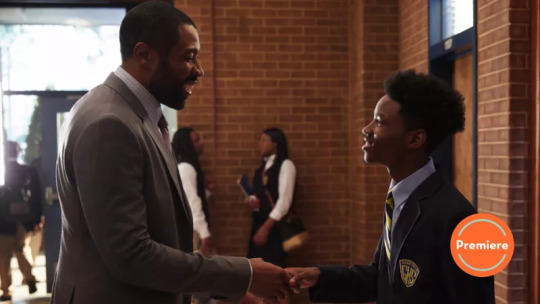
In Black Lightning’s season finale, there’s a scene in which Jefferson Pearce’s (Cress Williams) two daughters surprise him during the final lap of his morning run. It doesn’t have any consequence to the larger story, it’s just a nice, happy, family moment. I would find that out of everything in Black Lightning’s very well done first season, this was the image that stuck with me and I wasn’t exactly sure why. It would take me thinking about the season in its entirety, especially in comparison with other similarly black led shows, to fully grasp why it had had such an impact on me.
Black Lightning’s 13-episode season introduced us to a hero unlike any other on the CW’s ever-expanding roster but more importantly, in Jefferson Pearce, it introduced us to a black man unlike any other on TV. A black, male, character markedly distinguished by his effervescent hope and constant optimism.
Jefferson’s positive outlook, possibly borne out of his dual roles as a father to two girls and a high school principal, was always unwavering. He was not naïve, he appreciated the perils of being a black person, but he consistently chose to see the good in people and maintained his belief that the system would always, eventually, do the right thing. This active decision to see the bright side placed him as an undisputed community leader and role model.
It had not occurred to me, before now, how abundantly pessimistic the black, male, TV character was. As a black man aware of your place in today’s world, it is very easy to be hopeless or defeatist. You become conscious of the fact that in society, you are perpetually on the back foot and will continuously be denied the benefits that your white peers would be freely handed. This fosters an adversarial attitude in you. You begin to understand and accept that you will need to fight for anything you are going to get, no matter how small. You accept that you are starting every race a couple of metres behind and even then, the race is still rigged against you.
My own personal acceptance of this mindset was possibly why it did not seem out of place to me when male, black TV leads continuously exhibited such dreary outlooks on life. It had become the norm for me- my comfort zone.
Black and Sad
On Black-ish, Andre Johnson’s (Anthony Anderson) co-workers constantly joke about how he is able to trace the roots of every issue he faces to race- it's his superpower. He is able to continuously draw that line of causality because he knows something his co-workers will never truly understand.

It is bold for the show to have Dre exhibit such feelings. He maintains a pessimistic attitude not really characteristic of a sitcom lead but perhaps more importantly, very characteristic of a black man today. He understands and constantly laments the fact that various institutional and societal structures have been built, over decades, solely to adversely affect people with his skin colour. That’s what he knows and wants them to understand- it is always about race.
This innate pessimism is again, wonderfully shown in Atlanta. Earn (Donald Glover), a broke Princeton dropout, wants to manage his up and coming rapper cousin, Alfred (Brian Tyree Henry), in order to provide for his young, burgeoning, family. A task he manages to continually fall short of. Earn’s many problems stem from the fact that, unlike Alfred, he has not yet grasped how the world really works.

Things come to a head in the season 2 finale, aptly titled, “Crabs in a Barrel”. Earn is tasked with, amongst other things, securing a lawyer for Alfred. He is insistent on a successful black lawyer he has located but Alfred is adamant that he wants a Jewish lawyer. Alfred believes that being black can only take you so far. Instead of taking on board another black person who has the system set up against him, he would rather game the system by hiring a Jewish lawyer whom the system benefits.
This is an episode which drops such pearls of wisdom like this from Alfred:
“niggas do not care about us, man. Niggas gon do whatever they gotta do to survive, because they ain’t got no choice. We ain’t got no choice either.”
And this from Darius (Lakeith Stanfield) to Earn:
“you’re learning but learning requires failure. Al just tryna make sure you ain’t failing in his life...y’all both black so y’all both can’t afford to fail”
As can be gleamed from these quotes, the episode emphasises that it is now solely on Earn to acknowledge the game he is in. To develop that adversarial attitude. To understand that he is a crab and all the other crabs are doing what crabs do.
Pinned in a corner and faced with very limited options, Earn finally, in a thrilling sequence, exhibits an acknowledgement of this status quo. He finally, to both his and Alfred’s benefits, starts acting like a crab in a barrel.
Why Always Sad?
As stated earlier, I found it very easy to identify with this hopeless characterisation of the black man. As a result of my comfort in this box, I didn’t realise that this depiction was so prevalent until Black Lightning rolled around. Which led me to a bit of thinking.
Why was this depiction so rampant?
Cui bono. Who benefits
My initial inclination was that it was for the “oppressors”. A way of achieving converts. Perhaps watching Dear White People Vol, 1 and seeing a gun being pulled on Reggie (Marque Richardson Jr.) and its ensuing effect was a better education than listening to Sam (Logan Browning) vent on her radio show. Perhaps this provided a better conduit for an “ally” into empathising with our struggles. It provided them with a “cause” to rally behind instead of the abstractness of speeches and pleas.
This was one direction. I wasn’t completely sure I was fully on board, but it was a possibility.
Another, more palatable suggestion was that these haunting depictions were what we needed. This is the representation we deserve. A validating representation for those of us who are constantly plagued with these feelings of hopelessness, defeat and claustrophobia but have to consistently mask them in our “yeah, it’s all good” facades. Seeing these feelings represented onscreen, gives a certain form of assurance. It comforts us by showing that we are not alone in having these feelings and that maybe, we have sufficient reason to feel this way.
So, Positive or Negative- which is better?
I must admit and in doing so apologise, that I do not have a tidy resolution all tied up with a bow for you. I don’t have a satisfying answer to posit. I had first approached this question with the mindset that the constant pessimistic depictions and this rare, optimistic portrayal in Jefferson Pearce were at odds with each other- that they were at opposite ends of the spectrum. However, maybe it is merely an evolution-maybe they actually go hand in hand. Maybe this portrayal of a man who constantly chooses to see the good in the world, is a direct result of the earlier characters who couldn’t, who were filled with dread and a lack of hope. Maybe you can’t have one without the other.
I understand and appreciate the motivations behind black creators finally showing their true feelings on screen. It is educational and cathartic, they are able to express their true, raw, emotions- it is a rant bottled up for generations finally being let out, wrapped up in beautiful dialogue and interesting plot.
Perhaps in having the opportunity to put down this rant, it finally gives black creatives the chance to evolve, to grow. For instance, if the first step was representing your anger with the world and its injustices, maybe the next is documenting your hope for the future. That is what Jefferson represents- the hope that one day black men would get the privilege to be optimistic, to be hopeful.
The adversarial attitude can only take us so far. To make real progress, we will need the perfect cocktail of the adversarial mindset and a little bit of optimism and belief. A bit of hope that the world will give you what you deserve and just the right amount of ruthlessness for when you have to take what belongs to you.
So, here’s to achieving that perfect cocktail.
Bankole Imoukhuede
@banky_I
#black lightning#atlanta#black-ish#anthony anderson#donald glover#brian tyree henry#lakeith stanfield#black men#race#representation#tv
0 notes
Text
The Revolution will be Televised
Part One of Three
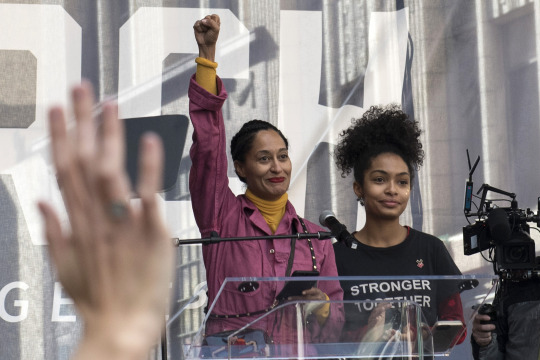
In the mid- 1940s, there was an industry wide crackdown on all suspected communists in the entertainment industry (even though being a communist was not a crime at the time). This crackdown unofficially began with the interrogation, incarceration and decades long blacklisting of a group that would become known as “The Hollywood Ten”. The prevalent accusation levied against them was that they had knowingly inserted communist propaganda into their films. Their blacklisting would continue all the way into the 1960s.
I bring this up, to reiterate a known but often times downplayed point- the importance and influence media holds over society’s consciousness and consequently, society’s inability to adjust when said media decides to challenge the status quo (for better or worse).
Great film and TV stories are by design, created to mine a certain type of reaction/feeling from the audience- most times either sympathy or empathy. By watching a story unfold from the points of view of the main characters, we understand the motivations for their actions hence, we understand why their highs are so pleasing and why their setbacks are so severe.
For avid TV watchers, we had become quite conversant with the white point of view. Thanks to the predominantly white stories constantly being told, audiences had developed sufficient empathy for the (white) middle class, 30 something. We had been exposed to their various stories and POVs, over several years, networks and television shows. Now, these were not bad stories, far from it, but this landscape was definitely not an accurate reflection of the real world.
Which leads us to the buzzword of the last few years- Representation. Minority groups have been clamoring for due “representation” in the film and TV landscape for years. This, unfortunately and perhaps inevitably, led to a wave of token inclusions. However, luckily, it also led to true representation, the type of representation I will focus on, the type of representation that has stoked the fires of the eponymous revolution.
If this is all new to you, grab a seat and Welcome to the Revolution.

Back in 2014, 45, then just an opinionated, old, blowhard, tweeted (shocker) his opinions on ABC’s new show. This was not an isolated viewpoint. As we would soon discover, he wasn’t just some old man shouting at the wind but rather the most vocal of a hidden, constantly growing, group.
From early on it was evident the uphill battle Black-ish was going to face. This was not a new foe. It is a battle many "diverse" shows continue to face. The insertion of a black family’s story into the Modern Family and Big Bang Theory TV comedy world was such a jolt to the senses that the white majority did not know how to react. Of course, once this began to make them feel a little bit uncomfortable, they were quick to jump to the conclusion that they were most definitely the victims of “reverse racism”.
“Imagine if this was the other way around. A show made by and starring only white people”
“You mean every other show?”
Over the past four years, Black-ish has grown and continued to tell stories that few shows before it could even attempt. It has told stories about the various, often maligned, shades of the black experience. It has strived to thrive and continuously looked for ways to improve, despite the target on its back- a target very familiar to any person of colour operating in a predominantly white space.
It is not a perfect show and it has had some missteps during its 4-year run but it is a show that is willing to embrace what makes it different. It uses this peculiarity to appropriately represent those who have, up till now, not seen their lives, emotions, dreams and fears represented. They are able to celebrate a humanity that had for so long, not even been acknowledged.
Standing alongside Blackish, perhaps proudly, in the camp of shows accused of being racist against white people, is Netflix’s Dear White People. The first season of Dear White People had the high honour of being on my must-binge list of 2017. The second season, impressively, improves on everything good from the first season and deftly fixes the (few) criticisms of the first season. Dear White People, though billed as a comedy, ditches the sitcom style that Blackish uses and employs a more adversarial approach to discussing the black experience. So, expectedly, even more white folk thought they were experiencing racism.
While Blackish can be seen as a mere representation of the black experience, Dear White People, especially in its second season, aims to have its characters front and center, fighting the banes of Black living (racists, online trolls, institutional racism, police brutality etc) while also building on its brilliant work from the first season of examining the different facets of the Black Identity.
youtube
The Role of the Converts
“...the fact is that certain members of the oppressor class join the oppressed in their struggle for liberation, thus moving from one pole of the contradiction to the other... Theirs is a fundamental role, and has been throughout the history of this struggle."
-Paulo Freire, Pedagogy of the Oppressed
Converts from the oppressor class are always essential. The revolution does not succeed on the whims of the oppressed alone. The converts intrinsically have an important role to play as former “oppressors” who now understand the plight of the oppressed and are determined to use their privilege to correct these wrongs.
It is because of this, that I appreciated that white people were able to watch shows like Blackish and Dear White People and learn. It gave them an avenue to be able to, understand and empathise with the Black experience. An opportunity for them to see points of view other than their own. The Revolution was catching fire.
What I had not yet noticed though, were the other Revolutions starting. The Revolutions in which I was the oppressor, in which I would need to be the willing convert.
"...It happens, however, that as they cease to be exploiters ...and move to the side of the exploited, they almost always bring with them the marks of their origin: their prejudices and their deformations, which include a lack of confidence in the people's ability to think, to want, and to know. Accordingly, these adherents to the people's cause constantly run the risk of falling into a type of generosity as malefic as that of the oppressors."
-Paulo Freire, Pedagogy of the Oppressed
Being a convert/ally would require a lot of introspection and a willingness to learn. I knew this because it was what I had been asking of my oppressors. I knew that I would need to check my privilege. In order to understand the other revolutions, I would need to take a step back and listen.
Similar to the Black shows, there is a paucity of female fronted/produced shows. However, what they lacked in quantity, they ably made up for in quality. Several of the recent female focused shows span various genres and employ varied storytelling methods, something for everyone.
In Insecure, we get a simple but highly effective story of black women navigating the nuances of loving while black, working while black and just generally trying to figure life out...while black. What Insecure has that few (if any) shows had before it is that its lead female characters are allowed to fuck up. These characters cheat, lie, enter toxic relationships and are even sometimes (most times?), the toxicity in the relationships. Sure, they are called out for it but what the show remembers is that that’s what life is- a continuous cycle of fucking up and learning from said fuck ups. I mean, it is what white men have been showing us in film and TV for decades.
Unlike Insecure, Jane the Virgin has anything but a simple story. There are four women at the center of its sprawling storylines, three of whom, the Villanueva women (Jane, Xiomara and Alba), I talk about with glowing praise in an earlier post. The fourth, Petra Solano is one of the most dynamic characters on Television- able to swivel from caring mother, to primary villain all the way to a victim with relative ease (sometimes all within an episode). Jane helps to open the door to another set of real-world-representing women dealing with some of the problems that are common to all women and some that are peculiar to them as Latina women (or you know, a virgin with a son). As such, the show has appropriately tackled many issues peculiar to that demographic, some of which have included realistically and faithfully interpreting Christianity in today’s world and the effects of immigration on both sides of the border.
Jane the Virgin's fellow network (CW) mate, Crazy Ex-Girlfriend is a show that has unfortunately gone under the radar of the general populace over the past 3 years. Of course, any initial description of the show will have that title, which could initially come off as quite problematic, and the assertion that it is a musical comedy, might only serve to drive away even more viewers. However, this show is so much more than that. Using the musical genre for societal satire is probably an idea that has been done before but I will struggle to believe that it has ever been done this well.
Where the show excels though, is in its use of its generally more relaxed tone and the musical numbers that are perfectly interwoven into the show's plots to (faultlessly) tackle some very heavy material, not least of all mental health. Without giving away too much, Crazy Ex-Girlfriend and specifically, its just concluded third season has been established as a more than efficient vehicle for addressing and discussing mental health issues on mainstream TV. It may not be “Mental Health for Dummies” but it is more than capable of enlightening any willing participant.
I am very inclined to conclude with analyses of The Handmaid's Tale and Big Little Lies and wax lyrically about their critique of society's general treatment of women but honestly, at this point, I am not sure what new thing I could add about those shows.
Now, I’m not saying that the presence of all these shows stoked an activism fire in the stomach of every person that watched it. What it did do, however, is show the represented demographics that their experiences were not peculiar to only them. It validated their experiences by highlighting that they had every reason to feel however they wanted to feel about these experiences. It represented them.
What has also been interesting to witness has been the involvement of the actors and creators in the activism for the issues their shows talk about. They have practically become involuntary activists. To some, this might seem like an expected course of action- If you make a show advocating for “Black Lives Matter” or “#MeToo”, then you should be at a rally. However, that is not always the case and the rise in these “celebrity activists” has definitely spurred the general populace to fight for these causes that they are passionate about.
“But I suppose the most revolutionary act one can engage in is... to tell the truth.”
-Howard Zinn, Marx in Soho: A Play on History
Truth in storytelling cannot be overestimated, especially in regards to those who have lived the experiences being told. In an earlier article, I alluded to the possible impact the release and adoration of Wonder Woman had on the rise of female empowerment movements (#MeToo, Time’s Up) in the following months.
Now, I am not brazen enough to tell you that some shows on the idiot box have led to widespread, worldwide activism and rallies for change. What I can tell you though, is that the impact of truthful representation knows no bounds. That feeling of actually seeing your fears, hopes, anger, joy- experiences you thought were only particular to you- being represented can only spur you on to start/continue fighting.
This truthful representation helps in one's realisation that they are not alone in how they feel. That, by you getting up and joining a rally or using a mere hashtag, you are not just one person doing a negligible act, you are joining a movement much larger than yourself. You are now a part of a society of like-minded individuals. That feeling of camaraderie is invaluable and it is in such societies that these revolutions will be won. For now, just keep watching because something great is (still) happening.
Bankole Imoukhuede
@banky_I
#black-ish#dear white people#insecure#jane the virgin#crazy ex-girlfriend#the handmaid's tale#big little lies#revolution#tv
4 notes
·
View notes
Text
It’s not just you, even superheroes have father issues.
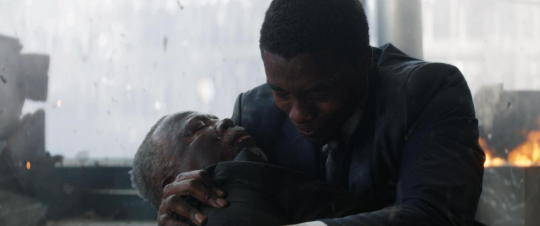
Minor Spoilers for Iron Man 2, Guardians of the Galaxy 2, Thor: Ragnarok and Black Panther.
Are our heroes allowed to be anything other than what we expect of them? Are they afforded the luxury to differ from our expectations?
Most children have two sets of superheroes- the heroes on their pages/screens and the real life heroes: their parents. Over the course of the years, both sets of heroes get certain expectations ascribed to them. Sons (for the sake of this article), begin to hold their fathers to certain standards. We begin to, in many cases, equate them with our comic book heroes. These may not be fair, or even entirely accurate standards to hold them to, but the validation is right there in their names- they are our superheroes, hence better than most.
One of the most endearing things about comic book heroes is that they go through the same problems we go through, with father issues proving not being an exception. Granted, the father-son relationship is an overused trope in pop culture (that’s what happens when you have dudes writing all the stories), but it remains an intriguing and complex relationship (both in real life and onscreen). An aspect of intrigue always being how the fathers choose to carry out their roles.
On the one hand is the outdated idea of the "macho man"- the hard man, head of the house. Provider. His job is to make sure his family’s needs are always met, no matter what (this is often paired with an inability to show any positive emotion). On the other hand, rests the noble desire to protect his family, to shield his children from the harsh, cold world till he felt they were sufficiently prepared to face it. Then, somewhere in between, burgeoned the façade. The façade that would become the persona many fathers would eventually present to their sons- a façade of invulnerability and omniscience. “What I say goes” “My way is the only way”.
As a young boy, already believing his father to be a "superhero", this façade only helps to cement that nascent thought. Of course you buy into the hype, you know no better. All you know is what you see and all you see, is what is shown. So even when the rest of the world exemplifies that there is more to everyone than meets the eye, we disregard this for our fathers. It will eventually take us far too long to see them as the flawed humans they are, susceptible to missteps and grave misjudgments.
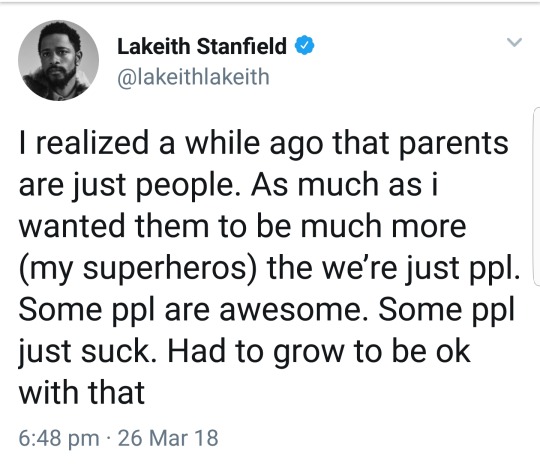
Three out of Marvel's last four movies have sought to portray that realisation on screen- the crashing of the façade (with Spiderman: Homecoming expertly sidestepping that Uncle Ben shaped hole). They’ve managed to show, through some of our favourite heroes, the various shades to that father-son relationship. Peter Quill (Chris Pratt), Thor (Chris Hemsworth) and T'Challa (Chadwick Boseman) are all forced to confront the idea that their fathers are not entirely what they always believed them to be, continuing a Marvel staple that began with the clubhouse leader, Tony Stark (Robert Downey Jr.) back in Iron Man 2.
For Thor and T'Challa, their fathers were also their kings. As a result, these forced confrontations, not only gravely affected how they saw their fathers but also, logically, how they saw themselves and their approach to their future duties. They had spent their entire lives being bred to rule and had willingly studied their fathers closely as prime examples of good leadership.
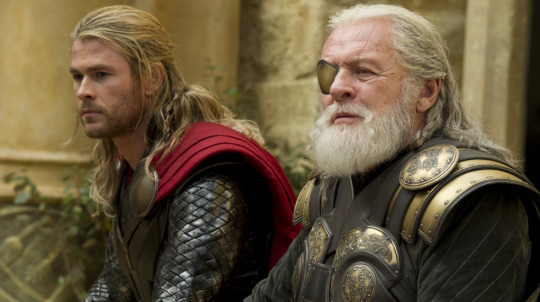
Irrespective of what was going on around him during the Thor trilogy, some things always remained consistent for Thor- his love, admiration and respect for his father, his King, Odin (Anthony Hopkins). Everything he did, either as a warrior or a prince, was in the hope that it would make his father proud.
Similarly, T'Challa grew up adoring and learning from his father, T'Chaka (John Kani). A King adored by his people, he always put his people first and led his nation courageously and intelligently. He was the blueprint for the type of King T'Challa hoped he would one day be. Thor and T'Challa both held onto these perfect ideas of their father as men, fathers and kings who constantly led through morality and justice.
For T’Challa and Thor, holding on to these long held beliefs only worsened the eventual confrontations with their fathers’ secrets. T'Challa is ambushed with the realisation that his father had, for years, covered up a murder he committed (albeit for noble reasons) and had left his infant nephew in a different continent to grow up without a father. This, of course, is a stark contrast to the noble king he had spent his life admiring. This was not the image of his father he was familiar with.
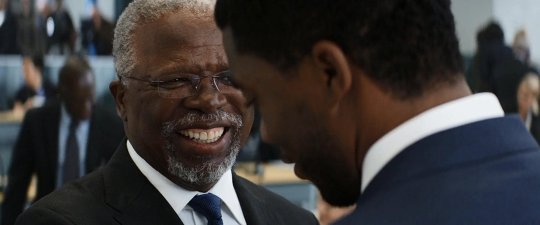
Thor is confronted with a similar rewrite of history. He is presented with the bombshell that his father had not built his kingdom through diplomacy and peaceful resolutions, as the history books told it, but rather through war, conflict and death. The peaceful and diplomatic Odin was actually a murderous conqueror. It is fitting that the villains in both movies are family members who are direct results of these secret acts. They force both Thor and T'Challa to quickly acclimatise themselves with both these shocking reveals and the new versions of their fathers they were now presented with.
Now, your father didn’t commit murderous acts in his past but what he did do was make mistakes. He will also continue to make mistakes which is why it is important for us to see and accept them as humans, who will make mistakes. We have to understand that the façade we had come to believe as gospel is indeed just that, a façade. The sooner we are able to understand and accept that, the easier the rest of the journey becomes.

Peter Quill, on the other end of the spectrum, represents the absent father relationship. Peter grew up without his father and tragically, resorted to telling his friends that his dad was David Hasselhoff and he was always away touring with his band or shooting his show (the awesome Knight Rider). After the death of Peter’s mum, he is abducted by a group of alien outlaws led by Yondu (Michael Rooker), whom we later find out was sent to retrieve Peter by his dad (more on that later).
Yondu decides not to deliver young Peter, informing Peter that this is because he is skinny and can fit into tiny spaces hence, "good for thievin'". He raises Peter as his own and eventually inducts him into his group of outlaws- the Ravagers. Peter is never able to see Yondu as anything more than his abductor. To Peter, he is the grumpy old man that kidnapped him from his home planet and continually threatened to eat him if he ever stepped out of line.
"You said you were going to eat me"
"That was being funny"
"Not to me!"
Peter would eventually meet his real father and unfortunately, be confronted with the opposite of what he had spent his entire life imagining his dad would be like. It would be in meeting this anti-expectation that Peter would be able to appreciate Yondu for being that father he had been searching for all along.
Peter had solidified the ideas of both what his father should be like and what Yondu actually was, that he didn’t realise the love that was already in his life. He took for granted the love Yondu showed him because he was already set in his ways towards Yondu. He did not recognise the father that had been present for him for the majority of his life.
We now arrive at Tony, the one who with the present but absent father.
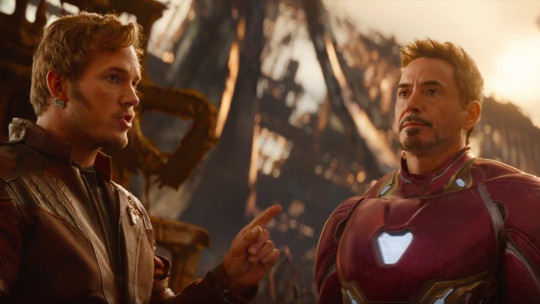
"He was cold, he was calculating. He never told me he loved me, he never even told me he liked me"
Growing up, Tony Stark had no reason to believe that his dad liked him and while he respected him greatly, as he grew older, he saw less reason to maintain this unrequited love. Howard remained Tony’s hero though, he was in constant awe of his intelligence and business acumen and he spent his whole life trying to live up to his father's expectations and after his father's death, his legacy. Sure, as head of his father's company, he maintained that he and his father were close and that he had been lucky to have him but in that rare candid moment with Nick Fury (Samuel L. Jackson), he finally puts his real feelings in words.
In a comic story, is a universal truth hidden, a feeling almost every child experiences- the search for validation. As earlier mentioned, we see our parents as our heroes. We look up to them, we are in constant awe of their accomplishments and continually seek validation from them because, obviously, what is more important than your hero’s validation?
For Tony, the search for this validation would subconsciously guide and haunt his adult years. It takes going through his father's decades-old materials to find that validation. In a video, recorded over thirty years prior, Howard Stark (John Slattery), calls Tony "his greatest creation", praising his intellect and showcasing belief in what his son would eventually become. At that moment, an adult Tony Stark finally receives that validation many sons (secretly) crave.
Howard Stark's façade and all its accompanying beliefs prevented him from telling his son how he really felt about him. He appeared distant and emotionless as a way to toughen up his son and prepare him for the trials the world had waiting. From his point of view, he was protecting his son, preparing him for the world that was waiting for him. However, all this would do is lead his son to believe that his father didn't care about him, resulting in statements like "he wasn't my biggest fan...You are talking about a guy whose happiest day was when he shipped me off to boarding school."
Out of the four relationships examined, Tony's relationship with his father is probably the one that best mirrors most father-son relationships. It is also no coincidence that this relationship is the only one that is improved by the shattering of the façade. Uncovering his father’s true feelings helps Tony get rid of the chip on his shoulder and move on. He is able to finally see his father in a new light, understanding his perspective and the motivations for his actions.
youtube
Perspective. The relationship between Howard and Tony definitely highlighted the importance of looking through the other person's point of view. Tony had never even considered coming to terms with his father's decisions because he never sought to approach things from his point of view. Even in adulthood when he was in a better position to understand his father's reasoning, he never attempted it. He was planted firmly in his corner. Howard, on the other hand, never considered how his actions might have been affecting his young son. If he did consider this, he always fully believed that his actions were the best ones for his son in the long run. He disregarded his son's perspective for the belief that he knew best. Experiences many of us can empathise with.
The other three relationships (Thor/Odin. T'Challa/T'Chaka and Peter Quill/Ego/Yondu) help to highlight that no one person is just one thing and that everyone, even our fathers, can never be perfect. We are all the results of our mistakes. Our fathers (even kings) are guilty of regrettable decisions. These relationships help to deter us from holding on to those idealised versions of our parents for far too long. It prevents us from spending our entire lives ascribing unrealistic standards to our fathers only for them to turn out to be planets that want to make the entire universe in their image (I mean, probably not but...maybe?).
What they all show though, is the importance of honesty, transparency and vulnerability. Perhaps we have transcended the notion of the façade. Perhaps it is now okay to be open and honest with your children. To be vulnerable when the time called for it. Perhaps it is now okay to show your humanity. To show that you are no superhero. Perhaps.
Far be it from me to postulate the right way for fathers to raise their children or to speak from any other perspective other than my own but I do know that, like with every other thing, a greater understanding of the other party's point of view is always the first step in the right direction. Nothing is ever one thing, especially not something as complex, volatile and imbalanced as the father-son relationship. Conversely, few relationships are as enriching, dynamic and invaluable as this relationship has the potential to be. So, as fathers who were once sons and sons who will be fathers, is it not imperative that we aim to continually evolve and do all we can to enable the relationship to reach its full potential?
Bankole Imoukhuede
@banky_I
#marvel cinematic universe#dads#robert downey jr#chris pratt#chris hemsworth#chadwick boseman#black panther#iron man#guardians of the galaxy#thor ragnarok#avengers infinity war#sons#howard stark#yondu#odin#ego#tchaka#film
67 notes
·
View notes
Text
Escaping the Sunken Place: Why ‘Get Out’ was 2017′s Best Picture
"Sex Slaves!"

I tend to like the annual Academy Awards nominated movies, sometimes even love. I am guilty of singing the praises of notable Oscars' favourites like Moonlight, La La Land, Spotlight, The Big Short, to name a few. However, very rarely does a movie which I absolutely loved on initial release (before the awards' hype surrounds it), have as real a shot in the awards conversation as Get Out does. Now, a lot of people loved Get Out, so my love for it isn't a niche thing, it doesn't qualify me as an "arty, film buff" (that's reserved for my love of Boyhood and Lady Bird). Get Out was my best film of the year (closely followed by Dunkirk and Baby Driver) and I believe it should win Best Picture come March 4th.
There are certain types movies that get nominated and win Academy Awards. You can usually spot them from a mile away. From their first trailer, you know they are engineered to win awards. Sure, there are the few exceptions every year, but most of the time, the "Oscar movies" are of a similar mould.
youtube
These movies are usually released by the studios during what is referred to as the "Oscar season" which ranges from late October to the end of the year. This ensures that the movies remain in the voters' consciousness when voting for nominees (early January) and voting for eventual winners (mid-late February) commences. It is a tried and test formula. Out of the 43 Best Picture nominees, from the past five years, only 6 have been released before the end of August: The Grand Budapest Hotel (March), Boyhood (July), Mad Max: Fury Road (May), Hell or High Water (August), Dunkirk (July) and Get Out (February).
This is an incredible achievement for Get Out and a true reflection of the times as it has managed to remain a mainstay in society's general consciousness over a year from its release (the Sunken Place jokes are still rolling in). What is even more surprising, and pleasing, is that it was able to stay in the typically short-minded consciousness of Academy Voters ten months after its release, especially considering it is not one of those "typical" Oscar movies and doesn't boast any real A-list star. Very few films manage to do this and Get Out's almost unintentional ability to do it is one of the many reasons why it deserves to go home with the big prize.
While Box office returns are not a good indicator of who would/should win awards, it is important to note that out of this year's nominees, only Dunkirk ($525.6 million) has outperformed Get Out's $255 million and no other film was as profitable- Get Out was made on a budget of just $4.5 million while Dunkirk is a $100 million blockbuster. All these stem from my main point - it is a fucking fantastic film that is actually saying something.
Over the past year, the merits of Get Out have been written by several people, many of whom have expressed these positives more eloquently than I ever could but, please, bear with me. Ryan Coogler described Black Panther as serving medicine in ice-cream and I can't think of any other instance where that is more applicable than with Get Out. A biting social thriller disguised as a run of the mill horror movie. I will admit that I am not a fan of horror movies and as a result, I avoided watching Get Out for a few weeks until it was evident that I wasn’t just missing out on a movie but a real watershed moment, a culture shift.
The timeliness of its release definitely paid a huge part in the movie's success. Jordan Peele has said that he began writing the film in what he describes as "the post-racial lie"-The Obama Administration. The period in which white, liberal America was so sure that America had gone past racism, racism was over. He would finish writing and shooting the film towards the end of the administration and as luck(?) would have it, the movie would premiere a month or so after 45's inauguration. By which point, the "post-racial" farce was beginning to unravel.
One thing did change as a reaction to the new administration- the ending. While the original ending, which saw Chris (Daniel Kaluuya) being arrested after the massacre at the Armitage's house, was great, early test screening showed that it bummed people out and in the light of the new administration it was decided that "we (black people) needed to catch a break’. That is of course, not to say that the new and current ending is not great in its own right, it is. The collective gasp in my theatre when the cop lights appear and the sighs of relief and cheer when Rod's (Lil Rel Howery) face is shown might be my favourite moment in a theatre in 2017.
youtube
Jordan Peele's screenplay (which I hope he wins an award for, on Sunday) is incredible. It is brilliant in its simplicity and relatability. It is relatable to the black person who has been the butt of these microaggressions and for the white liberal who has said those things as a way to show that they were not racist. Any black person who has spent an uncomfortable amount of time around white people knows that feeling, when you are immediately asked "what sport do you play?" or if you are unfortunately big/tall and are constantly told how much of a "beast" you would be if you went to the gym regularly. If you are African then you are constantly asked about your opinions about whatever crisis in whatever African country. They have this uncanny insistence to talk about race to show that they don't care about race.
In Chris and Rose's (Allison Williams) introductory scene, he asks her if his parents know that he is black. She replies that it doesn't matter, her parents "are not racist". The black people in the audience know better, it does matter. The white liberals, however, would agree with Rose that it does not matter. It should not matter. They don’t see colour. I argue that Jordan is calling bullshit on that. You should see colour.
During the first two-thirds of the movie, Rose's dad, Dean Armitage (Bradley Whitford) makes statements about how incredible it is to experience other people's cultures or that he "would have voted for Obama a third time. Best President in my generation, hands down". These are statements black people are used to hearing, it is the other person's way of endearing themselves, it is meant to show how liberal they are. They "get it". We are so used to hearing these statements that we instantly shrug them off, they have good intentions.
It all comes to a head in the final act of the film when the Armitages are revealed to be the villains. It is deeply unsettling for a good majority of white audiences because, at this point, they have agreed with most of the statements Dean has made. They are statements they have made to their black friends or co-workers. These middle class, liberals whom they had identified with were actually the villains? What does that say about them?
It is telling that Jordan's script only uses the N-word once and it is spoken by Rod. These are not your typical racists. Sure, we know about the not gun-toting, confederate flag waving racists, but what about the racism that exists in the sphere of liberal, white elitism?
Get Out operates and succeeds on so many levels. It is wish-fulfilment for black people. The black horror fans who constantly scream at the dumb decisions made by the white leads in horror films and the non-horror watching black person, who finally gets to see his/her everyday experience told on screen. It also works as a wake-up call to those who, during the course of the film, found themselves guilty of committing the various microaggressions portrayed in the film. They were wrong and needed to change. Finally, it served as a very effective attack on society and its relationship with black people. Society's tendency to fetishise and exploit the black body while disregarding and belittling the black life.
Currently, the Oscar for Best Picture seems to be heading to either The Shape of Water or Three Billboards Outside of Ebbing, Missouri. If I was a betting man, I would probably guess that the controversy surrounding Three Billboards might drag it down and The Shape of Water would come out the eventual winner. However, nothing would make me happier than a surprise win for what I firmly believe to be the Best Film of the year.

Bankole Imoukhuede
@banky_I
#oscars#film#academy awards#get out#jordan peele#daniel kaluuya#best picture#allison williams#lil rel howery#bradley whitford#catherine keener
3 notes
·
View notes
Text
Predictions for the 90th Academy Awards
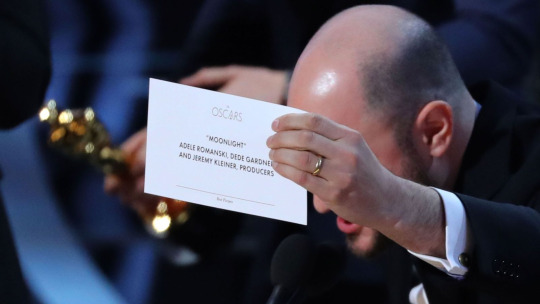
Nothing takes the sting out of these tough economic times like watching a bunch of millionaires giving golden statues to each other"- Billy Crystal, 2012 host
The Oscars are an enigmatic ceremony. In its simplest form, it’s a group of celebrities all patting themselves on the back for their various film achievements during the year. The majority of these celebrated films are often movies that mainstream audiences have neither watched (certainly not watched at the time of the Oscars) nor have any intention of watching. This, coupled with the derision usually aimed at the perceived self importance of the awards, makes it quite surprising how much attention is still paid to the ceremony. People still care who wins, people still want to know what happened during the almost 3-hour ceremony. The term “Academy Award winner” still commands a level of widespread respect, even to the person who has “Transformers: The Last Knight” as his best film of 2017.
So in anticipation of this year’s 90th Academy awards, I assembled a panel of other like-minded weirdos, Afolabi Adekaiyaoja, Chika Akachukwu and Obiora Ifeacho (all my female friends have lives so won’t waste their time watching the Oscars at 3a.m),and we discussed our reactions to this year’s nominees, who we want to win and who we believe will eventually take home the awards come March 4th.
POPCORN FOR DINNER: OKAY, LET’S START OFF WITH THE BIG ONE. THE “DRUMROLL AWARD”. WHO WINS BEST PICTURE?
Bankole Imoukhuede: This is the only category I will comment on. I think it’s such a shame Get Out isn’t the frontrunner at the moment. I do think it was the best movie this year and it’s a shame it doesn’t look like winning.
SHOULD WIN: Get Out
WILL WIN: The Shape of Water
Afolabi Adekaiyaoja: It is in years like this that I wish the Academy had stuck to their 5 nominees for this category. In that scenario, we don’t get so many filler movies. I think it is down to The Shape Of Water or Three Billboards outside Ebbing, Missouri. I prefer Three Billboards for its storytelling and simple character tales.
SHOULD WIN: Get Out
WILL WIN: Three Billboards outside Ebbing, Missouri
Obiora Ifeacho: I’m hoping that the Academy bucks its trend of being unfavourable to horror and comedy films, and gives Get Out the win. Don’t think it will though.
SHOULD WIN: Get Out
WILL WIN: The Shape of Water
Chika Akachukwu: I was actually (pleasantly) surprised Get Out got nominated. It might have just been a peace offering from the Academy though, to show they aren’t prejudiced. *insert relevant Sunken Place joke*
SHOULD WIN: The Shape of Water (despite its weak attempt to pass off bestiality as cool and romantic)
WILL WIN: Three Billboards outside Ebbing, Missouri
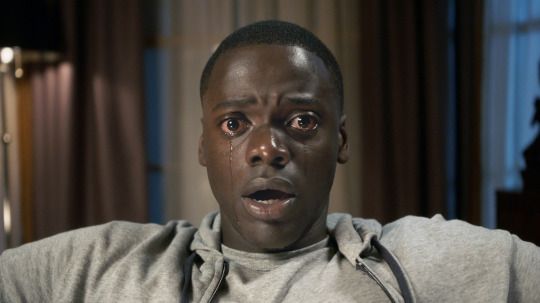
POPCORN FOR DINNER: THE ACTING CATEGORIES ALL SEEM PRETTY STRAIGHT FORWARD. RAPID FIRE. LEAD ACTOR
O.I: Gary Oldman (The Darkest Hour)
C.A: Yep, same
A.A: Yep, Oldman. Although I think Daniel Kaluuya (Get Out) should win it.
POPCORN FOR DINNER: LEAD ACTRESS
O.I: Frances McDormand (Three Billboards outside Ebbing, Missouri)
C.A: I really want Sally Hawkins (The Shape of Water) to win it but I think Frances McDormand wins it
A.A: Same. I think Sally Hawkins deserves to win it but its most likely going to Frances.
POPCORN FOR DINNER: SUPPORTING ACTOR
O.I: As Bill Simmons puts it, a “that guy” actor is an actor who you see everywhere but you don’t actually know his name and he never really has leading roles in successful films but you know him and appreciate his efforts knowing his time will soon come. Sam Rockwell (Three Billboards outside Ebbing, Missouri) was probably the greatest “that guy” actor of his generation. The award is firmly his. Sorry, that wasn’t quick fire lol.
C.A: Ditto. Loved Sam since Seven Psychopaths (Also written and directed by Martin McDonagh)
A.A: Willem Dafoe (The Florida Project) started off as the favourite, Christopher Plummer (All The Money in the World) is a big middle finger at Kevin Spacey, Richard Jenkins (The Shape of Water) is conveniently riding the wave of The Shape of Water (apologies for the pun), even though Michael Shannon (The Shape of Water) turns in a far better performance and Woody Harrelson (Three Billboards outside Ebbing, Missouri) is on for a little while but is naturally amazing. The only one left (Sam Rockwell) is the actor who really does make magic happen on screen and is just a delight to see.

POPCORN FOR DINNER: SUPPORTING ACTRESS
O.I: While I think Laurie Metcalf (Lady Bird) should win this, it seems to be another foregone conclusion. Allison Janney (I, Tonya)
C.A: She’s won every other award. Imagine if she didn’t win this one?
A.A: Allison Janney, although I would have preferred a debut win for Mary J. Blige (Mudbound)
POPCORN FOR DINNER: BEST ORIGINAL SCREENPLAY.
O.I: This really comes down to Get Out, Lady Bird and The Shape of Water, in my opinion. I think The Shape of Water wins it but I’ll be rooting for Get Out or Lady Bird.
A.A: I think Get Out should and will win it.
POPCORN FOR DINNER: FINAL CATEGORY. DIRECTOR.

Bankole Imoukhuede: Okay, I know I said that Best Picture was the only category I would give an input in but I am so annoyed Christopher Nolan (Dunkirk) isn’t winning this. Dunkirk in the cinema, in IMAX, was such an experience. I have absolutely nothing against Guillermo Del Toro (The Shape of Water) but I really wish Nolan was winning this.
A.A: Same. I think Nolan should win this. None of the other nominees, in my opinion, pushed the limits of the cinema experience while combining all the other aspects of moviemaking into a truly riveting and remarkable production, like he did with Dunkirk. It’s probably going to Del Toro though.
O.I: Christopher Nolan has found a way for production companies to fund his movies without relying on previous original material which is great. Very difficult to be commercially and critically successful in this day and age. Proper visual storytelling masterpiece. Del Toro wins it though.
C.A: Christopher Nolan could make a movie about anything and I’ll be game for it. The man gave us The Dark Knight. Not to mention, Bane impressions.
POPCORN FOR DINNER: OKAY, A COUPLE MORE QUESTIONS TO ROUND THIS OUT. WHAT WERE YOUR SNUBS AND OSCAR BAIT FLOPS THIS YEAR?
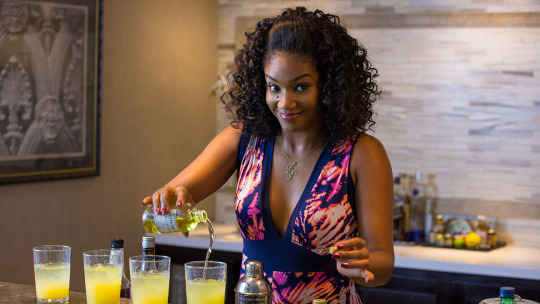
B.I: Snubs. Probably Franco (The Disaster Artist) (although with good reason). Oscar bait flop of the year would have to be Surburbicon. A period piece written by the Coen Brothers and George Clooney, including a true story subplot that reflects our current societal issues, directed by Clooney and starring Matt Damon, Julianne Moore and Oscar Isaacs doesn’t get a single nomination? Has to be the flop of the year.
C.A: There’s nothing I love more than simplicity and nothing I hate more than overcrowded stuffed casts. Hence, my vote has to be The Post. Sure, it got an obligatory Oscar nomination for Meryl Streep and a consolation best picture nomination but it was definitely shooting for bigger targets. I don’t want to see that many stars in one movie. It just screamed “Oscars” to me.
A.A: That’s funny because Tom Hanks (The Post) is one of my snubs, the other being Martin McDonagh (Three Billboards outside Ebbing, Missouri). My Oscar bait flop has to be The Greatest Showman. It was a musical written by Oscar-winning songwriters (check), had a big name star (check) and a romantic subplot (check). I’m pretty sure someone expected this to be the next Chicago. It sucks because I really love Hugh Jackman and think the basis- PT Barnum is a riveting tale. Still, it got nearly shut out.
O.I: My big snub is Armie Hammer (Call Me by Your Name). Others were Robert Pattinson (Good Time), Michael Stuhlbarg (Call Me by Your Name and The Shape of Water) and Tifanny Haddish (Girls Trip). I have to go for The Post for my flop too. Was never a fan from the moment it was announced last year
POPCORN FOR DINNER: WHAT’S YOUR FAVOURITE OSCARS’ MOMENT
O.I: Roberto Benigni winning Best Foreign Language film. How can you not be happy for Roberto Benigni when the Italian actor-director stood on top of his chair, waving at anybody and everybody, as he was walking across the seats to accept his award for Life is Beautiful? I mean, even Steven Spielberg was helping him on his way!
youtube
A.A: Knowing that everyone on my TL and circle expected Boyhood to win, hearing Sean Penn remark about a guy’s green card and realising it was Birdman in the split second before he confirmed it…amazing. It was a great reward for an amazing movie, great concept and wonderful execution.
youtube
B.I: Mine has to be Lupita’s acceptance speech for Best Actress in a Supporting role for 12 years a Slave. “No matter where you are from, your dreams are valid”. If that ain’t a clarion call to get creative, I don’t know what is.
youtube
C.A: “Hold on imma let you finish but Moonlight had the best picture award this year, La La Land”. (This is how it played out in my head last year)
youtube
POPCORN FOR DINNER: Parting words?
A.A.: And the nominees for now overdue Oscar win are: Amy Adams, Bradley Cooper, Michael Shannon, Joaquin Phoenix and Jessica Chastain…and the next one off is…
B.I: In a world where Logan got a (deserved) adapted screenplay nomination, I’m speaking it into existence that I believe, with the right campaign, Black Panther can nab at least one of a Supporting Actor, Director, Adapted Screenplay and Best Picture nomination.
O.I: GIVE ROGER DEAKINS HIS FUCKING OSCAR ALREADY
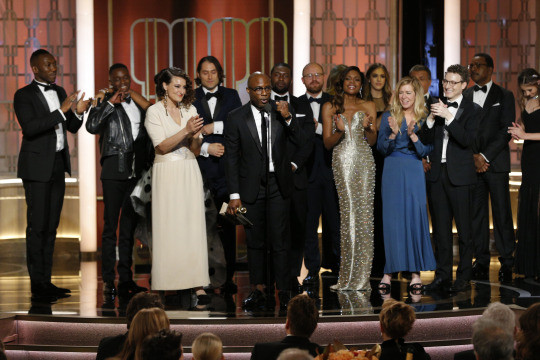
Bankole Imoukhuede
@banky_I
#oscars#academy awards#get out#call me by your name#the shape of water#three billboards#dunkirk#christopher nolan#jordan peele#daniel kaluuya#lupita nyong'o#gary oldman#allison janney#laurie metcalf#lady bird#film
29 notes
·
View notes
Text
Wakanda Forever: Finding Black Pride in Kings and Teenage Girls
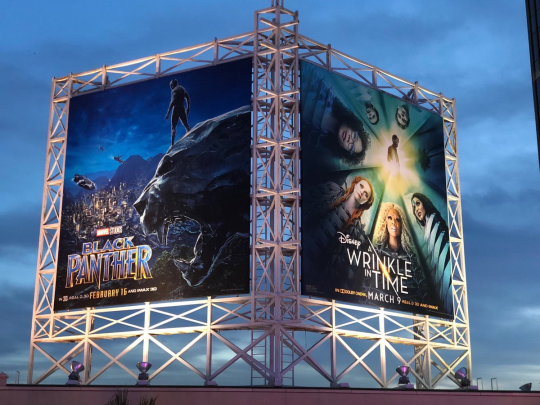
“You don’t know what you were missing, till you have it”
There’s a particular scene in Wonder Woman that often gets referenced when the film is being discussed; the “No Man’s Land” scene. I had the pleasure of watching Wonder Woman alone (yeah, come at me) and at the time of watching, I had no reason to believe that this would become an iconic scene. To me, it was just another good action set piece. Granted, one that I applauded (metaphorically, of course. I’m not trying to validate those stereotypes), but still, just a well-done sequence.
youtube
I would soon come to realise the power of subjectivity.
In various discussions since leaving that theatre, I have listened to countless women, both in my real life and online, talk about the effect that scene had on them. Their experiences of joy, pride and childlike glee, with many being brought to tears.
I am under no illusion that its star (Gal Gadot) and director (Patty Jenkins) were both aware of the importance of the scene they were constructing and the need for such a scene in this movie in today’s world. I quickly realised that this scene wasn’t (primarily) directed at me. Sure, I could appreciate it from a story or technical point-of-view, but it could never get me in my feels the way it did my female counterparts. Where I saw another hero blocking bullets, they saw a woman standing, against and for men, for what she knew was right. The largely underrepresented female, superhero-watching audience was finally seeing a woman exhibit such heroics on the big screen.
“Those who complain about representation, are the ones who’ve always been represented”.
Like most sane people, I love Will Smith. I grew up on Fresh Prince of Bel-Air reruns, then came the Men in Blacks, Hitch, Hancock, I, Robot etc. He was a movie star, he did it all: action, drama, comedy, sci-fi. To me, he was the movie star. I would go on to, harshly, learn that he wasn’t the norm, but the exception.
I was now seeing the ubiquity of white movie and tv stars, I now noticed that beyond the handful of black movie stars, people with my skin colour were criminally underrepresented. This was weird because I was living in a country (Nigeria) where everyone had my skin colour. So, to a young boy who was falling in love with the arts, the idea quickly became, only white people get that shot and maybe a handful of Black Americans, but even then, they definitely still gotta tell the white man’s story.
Which brings us to 2018. A year in which I get to see an African King and a black teenage girl save the world. An African King and a Black Teenage Girl! Many have criticised the hype for Black Panther, with some stating that the importance of the movie is being overstated by its fans. “Y'all acting like this movie gonna solve racism”.
I do not think the importance of these movies can be overstated.
youtube
Black Panther is a big budget superhero film that focuses on an African nation, its king and citizens. It features an impressive, predominantly black (and beautiful) cast. This cast not only boasts talented actors with strong African backgrounds (Lupita Nyong'o, Daniel Kaluuya and Danai Gurira) but it also includes actors based in Africa, not least of whom is the South African legend, John Kani. Twenty years ago, a convergence of all these factors would have seemed nearly impossible.
A Wrinkle in Time, in its own right, conquers its own fair share of impossibilities. In keeping with a career that continually breaks new ground while affecting change, Ava DuVernay now brings a sci-fi, Disney, epic with a brown skinned girl as its heroine. Who would have thought? Even in a world where Katniss Everdeen and Hermione Granger became household names and shot their respective actresses to bona-fide movie star status, such a movie still seemed impossible.
youtube
Ava DuVernay has not shied away from the fact that this is new ground for everyone. I’ll admit that I am not familiar with the original 1963 novel and its ensuing legacy (it wasn’t high on our literary lists in Nigeria). But boy am I excited. In creating this film that will inevitably be a sea change moment, Miss DuVernay has surrounded herself with notable producers (Catherine Hand and Tendo Nagenda), the writer and co-director of Frozen, Jennifer Lee and a cast that includes Mindy Kaling, Gugu Mbatha-Raw, Michael Pena and Oprah Winfrey (playing an all-knowing being, because, duh) along with Chris Pine and Zach Galifianakis rounding out the cast.
As mentioned earlier, A Wrinkle in Time’s heroine is a brown skinned teenage girl. However, this was not always the case. In the original novel, Meg Murry is white. Here she is portrayed by newcomer Storm Reid. Miss DuVernay has continually referenced her desire to create new worlds and how, expectedly, these worlds would be different from what her white and male counterparts would envision. The effect such inclusion could possibly have cannot be overstated.
Really, is that not what we hope for? What we all want? That inclusivity. A world in which a young girl can look at a big budget Disney movie poster and see herself as the heroine. A world in which we get Angela Bassett finally playing a queen. Where young brown and black skinned girls, and maybe just as importantly young boys, can see that girls can save the world too. The same world where the great Forrest Whittaker admits to carrying out extensive research on the Yorubas in order to bring authenticity to his role. This world only has positives. It provides filmmakers with more diverse voices, from different backgrounds, the opportunity to share their visions. All sorts of stories are told in this world and everyone gets to be represented. Such inclusion can only lead to better, well-informed stories and more opportunities for people too often left in the fringes.
In their introductory scene from Captain America: Civil War, King T’Chaka (John Kani) and his son, T'Challa (Chadwick Boseman) speak “isiXhosa” (A South African language). This was not originally in the script, it was an input from John Kani. This input led to a scene in a Hollywood film in which two actors are speaking isiXhosa and neither of them is a warlord nor an internet scammer. It might not seem like much, but in the grand scheme of things, it’s huge.
It just goes to show that the inclusion of diverse voices behind and in front of the camera bleeds its benefits in such subtle and wide-ranging ways. Some of these benefits may not be visible to the lay man but they mean the world to those marginalized groups.
At the premiere of Black Panther, John Kani gushed about the “seriousness” of the movie and why he wanted to show Africa and its denizens in a different light. To deal with the myth that “if the white colonialists did not land in Africa, we’ll still be walking in skins…”. Frankly, that’s a cause we can all rally behind.
Now, no one is saying that things are automatically fixed or that change has happened, we are definitely still some ways off but it’s a hell of time to be alive. What we need to then do, is not falter but use these burgeoning changes as catalysts for a much larger attack on the status quo.
While the eventual quality of both Black Panther and A Wrinkle in Time is not the driving force of this article, I would be remiss if I did not mention that in the hands of Ryan Coogler and Ava Duvernay, I feel little reason to fret about the outcome. They are two filmmakers that made instant splashes with their unique visions in Fruitvale Station and Creed (Coogler) and Selma and 13th (DuVernay). I’m not sure I trust any two people to better understand the importance of the positions they have been placed in and the need for success. They are not only capable of delivering the goods, they are more than deserving of the opportunity. They, it seems, live their lives by that mantra that we, as minorities have stuck in our psyche.
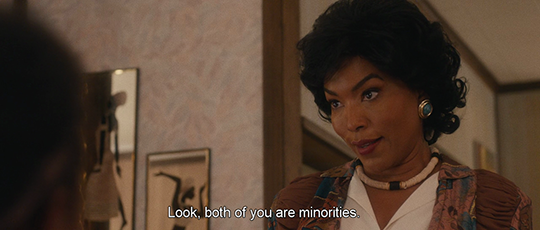

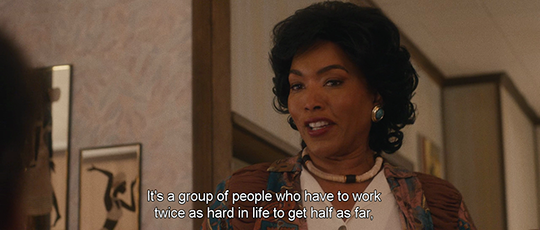
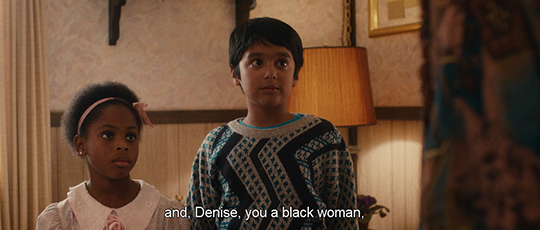

Would it be a stretch to draw a line between the release and adoration of Wonder Woman and the rise of female empowerment (#MeToo, Time’s Up) in 2017? Probably. Could I make the argument to you after some shots of Vodka? Most likely. The point is that change starts from all sorts of weird places and all we can do is hope. Hope that the change is not stifled by its location but given the space and support to grow. So yes, I’ll be with my tickets opening weekends of Black Panther and A Wrinkle in Time hoping that this is the beginning of some form of change in Hollywood that would hopefully grow and spread to the larger world.
Bankole Imoukhuede
@banky_I
119 notes
·
View notes
Text
Wakanda Forever: Finding Black Pride in Kings and Teenage Girls

“You don’t know what you were missing, till you have it”
There’s a particular scene in Wonder Woman that often gets referenced when the film is being discussed; the “No Man’s Land” scene. I had the pleasure of watching Wonder Woman alone (yeah, come at me) and at the time of watching, I had no reason to believe that this would become an iconic scene. To me, it was just another good action set piece. Granted, one that I applauded (metaphorically, of course. I’m not trying to validate those stereotypes), but still, just a well-done sequence.
I would soon come to realise the power of subjectivity.
youtube
In various discussions since leaving that theatre, I have listened to countless women, both in my real life and online, talk about the effect that the scene had on them. Their experiences of joy, pride and childlike glee, with many being brought to tears.
I am under no illusion that its star (Gal Gadot) and director (Patty Jenkins) were both aware of the importance of the scene they were constructing and the need for such a scene in this movie in today’s world. I quickly realised that this scene wasn’t (primarily) directed at me. Sure, I could appreciate it from a story or technical point-of-view, but it could never get me in my feels the way it did my female counterparts. Where I saw another hero blocking bullets, they saw a woman standing, against and for men, for what she knew was right. The largely underrepresented female, superhero-watching audience was finally seeing a woman exhibit such heroics on the big screen.
“Those who complain about representation, are the ones who’ve always been represented”.
Like most sane people, I love Will Smith. I grew up on Fresh Prince of Bel-Air reruns, then came the Men in Blacks, Hitch, Hancock, I, Robot etc. He was a movie star, he did it all: action, drama, comedy, sci-fi. To me, he was the movie star. I would go on to, harshly, learn that he wasn’t the norm, but the exception.
I was now seeing the ubiquity of white movie and tv stars, I now noticed that beyond the handful of black movie stars, people with my skin colour were criminally underrepresented. This was weird because I was living in a country (Nigeria) where everyone had my skin colour. So, to a young boy who was falling in love with the arts, the idea quickly became, only white people get that shot and maybe a handful of Black Americans, but even then, they definitely still gotta tell the white man’s story.
Which brings us to 2018. A year in which I get to see an African King and a black teenage girl save the world. An African King and a Black Teenage Girl! Many have criticised the hype for Black Panther, with some stating that the importance of the movie is being overstated by its fans. “Y'all acting like this movie gonna solve racism”.
I do not think the importance of these movies can be overstated.
youtube
Black Panther is a big budget superhero film that focuses on an African nation, its king and citizens. It features an impressive, predominantly black (and beautiful) cast. This cast not only boasts talented actors with strong African backgrounds (Lupita Nyong'o, Daniel Kaluuya and Danai Gurira) but it also includes actors based in Africa, not least of whom is the South African legend, John Kani. Twenty years ago, a convergence of all these factors would have seemed nearly impossible.
A Wrinkle in Time, in its own right, conquers its own fair share of impossibilities. In keeping with a career that continually breaks new ground while affecting change, Ava DuVernay now brings a sci-fi, Disney, epic with a brown skinned girl as its heroine. Who would have thought? Even in a world where Katniss Everdeen and Hermione Granger became household names and shot their respective actresses to bona-fide movie star status, such a movie still seemed impossible.
youtube
Ava DuVernay has not shied away from the fact that this is new ground for everyone. I’ll admit that I am not familiar with the original 1963 novel and its ensuing legacy (it wasn’t high on our literary lists in Nigeria). But boy am I excited. In creating this film that will inevitably be a sea change moment, Miss DuVernay has surrounded herself with notable producers (Catherine Hand and Tendo Nagenda), the writer and co-director of Frozen, Jennifer Lee and a cast that includes Mindy Kaling, Gugu Mbatha-Raw, Michael Pena and Oprah Winfrey (playing an all-knowing being, because, duh) along with Chris Pine and Zach Galifianakis rounding out the cast.
As mentioned earlier, A Wrinkle in Time’s heroine is a brown skinned teenage girl. However, this was not always the case. In the original novel, Meg Murry is white. Here she is portrayed by newcomer Storm Reid. Miss DuVernay has continually referenced her desire to create new worlds and how, expectedly, these worlds would be different from what her white and male counterparts would envision. The effect such inclusion could possibly have cannot be overstated.
Really, is that not what we hope for? What we all want? That inclusivity. A world in which a young girl can look at a big budget Disney movie poster and see herself as the heroine. A world in which we get Angela Bassett finally playing a queen. Where young brown and black skinned girls, and maybe just as importantly young boys, can see that girls can save the world too. The same world where the great Forrest Whittaker admits to carrying out extensive research on the Yorubas in order to bring authenticity to his role. This world only has positives. It provides filmmakers with more diverse voices, from different backgrounds, the opportunity to share their visions. All sorts of stories are told in this world and everyone gets to be represented. Such inclusion can only lead to better, well-informed stories and more opportunities for people too often left in the fringes.
In their introductory scene from Captain America: Civil War, King T’Chaka (John Kani) and his son, T'Challa (Chadwick Boseman) speak “isiXhosa” (A South African language). This was not originally in the script, it was an input from John Kani. This input led to a scene in a Hollywood film in which two actors are speaking isiXhosa and neither of them is a warlord nor an internet scammer. It might not seem like much, but in the grand scheme of things, it’s huge.
It just goes to show that the inclusion of diverse voices behind and in front of the camera bleeds its benefits in such subtle and wide-ranging ways. Some of these benefits may not be visible to the lay man but they mean the world to those marginalized groups.
At the premiere of Black Panther, John Kani gushed about the “seriousness” of the movie and why he wanted to show Africa and its denizens in a different light. To deal with the myth that “if the white colonialists did not land in Africa, we’ll still be walking in skins…”. Frankly, that’s a cause we can all rally behind.
Now, no one is saying that things are automatically fixed or that change has happened, we are definitely still some ways off but it’s a hell of time to be alive. What we need to then do, is not falter but use these burgeoning changes as catalysts for a much larger attack on the status quo.
While the eventual quality of both Black Panther and A Wrinkle in Time is not the driving force of this article, I would be remiss if I did not mention that in the hands of Ryan Coogler and Ava Duvernay, I feel little reason to fret about the outcome. They are two filmmakers that made instant splashes with their unique visions in Fruitvale Station and Creed (Coogler) and Selma and 13th (DuVernay). I’m not sure I trust any two people to better understand the importance of the positions they have been placed in and the need for success. They are not only capable of delivering the goods, they are more than deserving of the opportunity. They, it seems, live their lives by that mantra that we, as minorities have stuck in our psyche.





Would it be a stretch to draw a line between the release and adoration of Wonder Woman and the rise of female empowerment (#MeToo, Time’s Up) in 2017? Probably. Could I make the argument to you after some shots of Vodka? Most likely. The point is that change starts from all sorts of weird places and all we can do is hope. Hope that the change is not stifled by its location but given the space and support to grow. So yes, I’ll be with my tickets opening weekends of Black Panther and A Wrinkle in Time hoping that this is the beginning of some form of change in Hollywood that would hopefully grow and spread to the larger world.
Bankole Imoukhuede
#black panther#a wrinkle in time#ava duvernay#ryan coogler#marvel#disney#chadwick boseman#popcorn for dinner#black history month#film#marvel cinematic universe
119 notes
·
View notes
Text
Hurry! Call your mum (After reading this post though).
“Take care of yourself”. Those were my mum’s last words to me. An uncanny representation of the selfless life she led. What stands out to me the most about that conversation is my response to her. I remember replying something to the effect of “Me? You’re the one in a hospital bed”. It was a very Hollywood type of response but even back then, Film and TV were my only frames of reference for those types of uncharted territory moments. As I stood there, faced with several facts and emotions I strongly wanted to dismiss as fake, this “manufactured” response was the only thing that felt real to me.
11 years (to the day) and few things still feel real. There are some days when the pain is so visceral that you want to shutdown and there are days when you almost forget, which in turn leads you to hating yourself for getting to that point. Most days though, you are in an in-between state which is the most difficult of all. There is no manual for this shit.
The one thing that remains though, through it all, is how she made me feel. The things she did, her life of service, the lengths she would go to for her family and how all these things affected the man I would become. That is what I am inclined to write about. I am not going to eulogise my mum because I could do that forever. I would rather use the space to praise our mums.
Using some of my favourite TV mothers (because Film and TV blog, duh!), I’ll examine our mothers for the incredibly awesome human beings they are. As for anyone unfortunate enough to also be in my situation, I hope to remind you why you love her and why/how she will also be a part of you.
The Villanueva women (Jane the Virgin)
There are few things more pure than a mother’s love for her child. While it might seem the bare minimum that a parent loves their child, there is something transcendent about the love a mother has for her child. It might sound clichéd but clichés are clichés for a reason. This kind of complex, raw love is not displayed more honestly anywhere else than among the women of Jane the Virgin- Alba, Xiomara and Jane Villanueva.
The kind of love that can go from a screaming match one moment to teary apologies the next. The kind of love and friendship not only between grandmother/mother/daughter but also between 3 adults all within their rights to make their own decisions, mistakes and arrive at their own epiphanies.
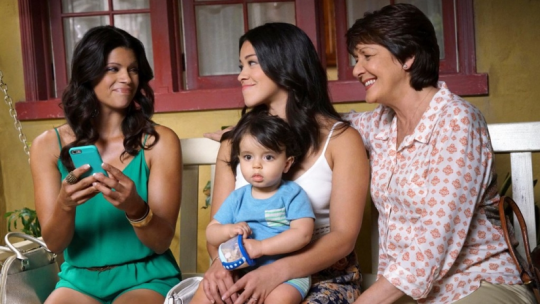
As many of you reading know, that adult relationship is an invaluable one. One that can provide you with the clearest advice and infuriate you in equal measure. To take this type of love/relationship for granted would be the greatest mistake anyone could make.
Rainbow Johnson (Black-ish) and Elizabeth McCord (Madam Secretary)

Being a woman is difficult and being a working mother borders on the impossible but so many of our mothers do it and do it flawlessly. As Elizabeth McCord (Madam Secretary) and Rainbow Johnson (Black-ish) prove, our mothers are most times the smartest people in the room but know when to show it. They take their natural empathy, selflessness and all round incredible attitude into the workplace, which only provides the best results. However, no matter how difficult or stressful work gets, their priority always remains the family they have at home and for this we are forever grateful.

Mary Cooper (The Big Bang Theory/Young Sheldon)
Whether you are spiritual or not, there is a certain comfort when you know someone is thinking about and praying for you. Even when faced with constant scepticism from her atheist son (Sheldon Cooper), Mary, is steadfast in her belief and continues to pray for her son. That is very commonplace with many of our mothers. They continue to pray for us and wish only the best for us even when we are not doing so ourselves. And as Mary constantly did, our mothers see only the beauty in us, even when (especially when) the rest of the world would rather highlight our flaws. And also like Mary, our mothers might not always be politically correct (!)
Cersei Lannister and Daenerys Targaryen (Game of Thrones)
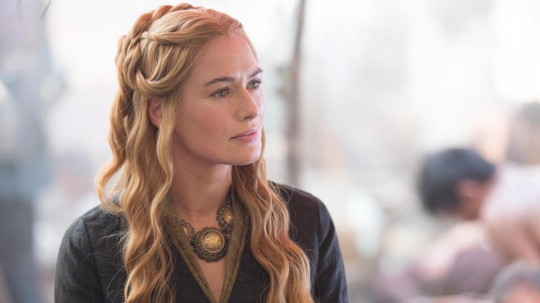
Now wait. Hear me out. Cersei might be an all-round terrible person who would rather let her people die than swallow her pride and fight alongside her contestant for the throne (I clearly have a lot of feelings on this) but her one (only?) redeeming quality would be her love for her children. From Cersei’s point of view, everything she’s done, she’s done for them.
For the purposes of this post, Cersei and Daenerys are probably more similar than they are not. Both show (admittedly to an extreme degree) what mothers are willing to do for their children and the lengths they will go to protect their family members (Start a seven-kingdom war?).

Claire Dunphy (Modern Family)
Would be almost impossible to write this post without including one of TV’s longest running mothers. Every COC (child of colour- Yeah I’m out here coining new terms) on some level can probably relate to the intricacies of Julie Bowen’s overbearing, know it all, micro-managing Claire Dunphy. Those were the lenses with which we viewed our mothers for so long until we took part in this whole adulting thing and could see more clearly where it was all coming from. Their immense love for us and concern for our future manifested in these traits we hated but now cherish.

Jessica Pearson (Suits)
Sure, Jessica doesn’t have children of hers but honestly after years of dealing with Mike, Harvey and Louis, are you really going to contend with me on this?
Jessica not only reiterates the point of being the smartest person in the room, she personifies it. She shows that no child is ever too smart, too old or too successful to be put in their place. Something most of us learnt from an early age, but sometimes need reminding. She is always on hand to put out any fire even putting out some before they start. She is also not above letting a fire burn to see how they deal with it.
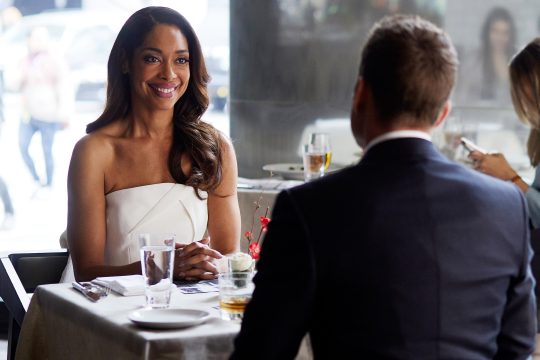
OG Status: The first Aunt Viv (The Fresh Prince of Bel-Air)
During Janet Hubert’s run as Aunt Viv (Seasons 1-3), the Banks family was blessed with one hell of a matriarch. Smart, funny, woke, stern but approachable. She showcased a side to the black woman/mother that wasn’t commonplace on TV at the time. She also perfectly embodied many of our mothers. To this very day, watching any of those episodes, I never fail to see my mother in her. She showed that many mothers, especially MOCs (Mothers of Colours- yeah feel free to make that a thing too) were incredible, strong, complex beings and she quite frankly was a combination of every value I have spoken about in this post.
youtube
I love my mum and will continue to do so for the rest of my life. For anyone who has lost someone as close, you know how difficult it can be. You also know how precious the time you spent with them was. You look back on the memories with such fondness and sometimes it is just enough to get you through the day. What is lasting, as I mentioned earlier, is the impact they have on you. That can never be erased and as much as I wish I could spend another day with my mother, I am eternally grateful for the years I spent with her. I am grateful because she has permanently made me a better person.
So, no need to procrastinate it, go ahead, call your mother and tell her how much she means to you and how much you love her.
But just in case, to all mothers out there, I say a heartfelt thank you.
R.I.P Izevbua Martha Imoukhuede
Bankole Imoukhuede
@banky_I
49 notes
·
View notes
Text
Hurry! Call your mum (After reading this post though).
“Take care of yourself”. Those were my mum’s last words to me. An uncanny representation of the selfless life she led. A fellow stand out of that conversation with her was my response- I remember replying something to the effect of “Me? You’re the one in a hospital bed”. It was a very Hollywood-type of response which makes sense because even back then, Film and TV were my only frames of reference for those types of uncharted territory moments. There I stood, faced with several facts and emotions I strongly wanted to dismiss as fake and this plagiarised response was the only thing that felt real to me.
11 years (to the day) and few things still feel real. There are some days when the pain is so visceral that you want to shut down and there are days when you almost forget, which in turn leads you to hate yourself for getting to that point. Most days though, you are in an in-between state which is the most difficult of all. Frankly, there is no manual for this.
The one thing that remains though, through it all, is how she made me feel. The things she did, her life of service, the lengths she would go to for her family and how all these things affected the man I would become. That is what I am inclined to write about. I am not going to eulogise my mum because I could do that forever. I would rather use the space to praise our mums.
Using some of my favourite TV mothers (because Film and TV blog, obviously!), I want to look at some of those things that make our mothers such incredibly awesome human beings. And as for anyone unfortunate enough to be in my shoes, this is to remind you why she will always be a part of you.
The Villanueva women (Jane the Virgin)
There are few things purer than a mother’s love for her child. While it might seem the bare minimum that a parent loves their child, there is something transcendent about the love a mother has for her child. It might sound clichéd but clichés are clichés for a reason. This kind of complex, raw love is not displayed more honestly anywhere else than among the women of Jane the Virgin- Alba, Xiomara and Jane Villanueva.
The kind of love that can go from a screaming match one moment to teary apologies the next. The kind of love and friendship not only between grandmother/mother/daughter but also between 3 adults all within their rights to make their own decisions, mistakes and arrive at their own epiphanies.

As many of you reading know, that adult relationship is an invaluable one. One that can provide you with the clearest advice and infuriate you in equal measure. To take this type of love/relationship for granted would be the greatest mistake anyone could make.
Rainbow Johnson (Black-ish) and Elizabeth McCord (Madam Secretary)
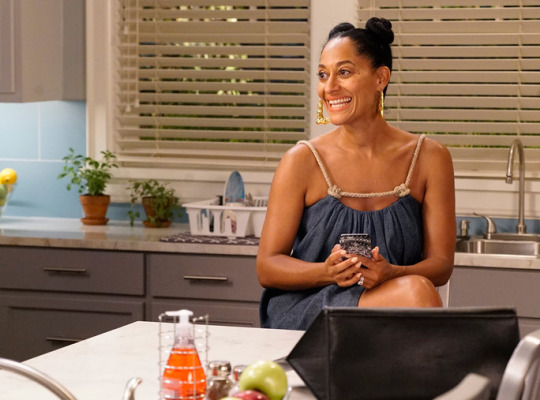
Being a woman is difficult and being a working mother borders on the impossible but so many of our mothers do it and do it flawlessly. As Elizabeth McCord (Madam Secretary) and Rainbow Johnson (Black-ish) prove, our mothers are most times the smartest people in the room but know when to show it. They take their natural empathy, selflessness and all-round incredible attitude into the workplace, which only provides the best results. However, no matter how difficult or stressful work gets, their priority always remains the family they have at home and for this, we are forever grateful.
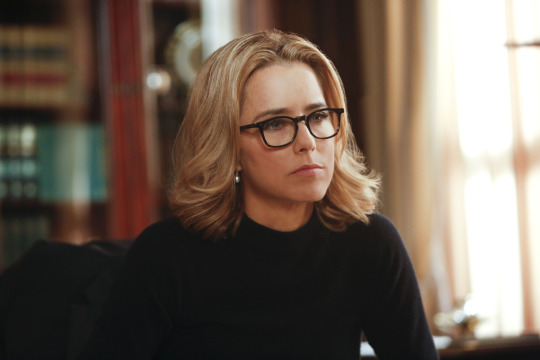
Cersei Lannister and Daenerys Targaryen (Game of Thrones)
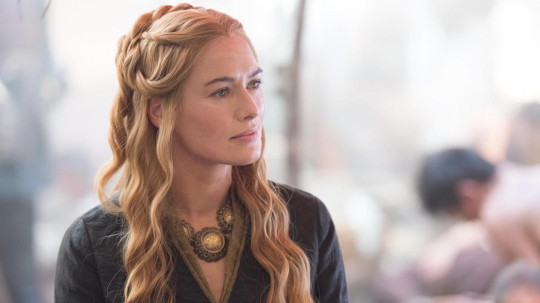
Now, wait, hear me out. Cersei might be an all-round terrible person who would rather let her people die than swallow her pride and fight alongside her contestant for the throne but her one (only?) redeeming quality would be her love for her children. From Cersei's point of view, everything she’s done, she's done for them.
For the purposes of this post, Cersei and Daenerys are probably more similar than they are not. Both show (admittedly to an extreme degree) what mothers are willing to do for their children and the lengths they will go to protect their family members (Which of our mothers hasn’t contemplated starting a seven-kingdom war?).
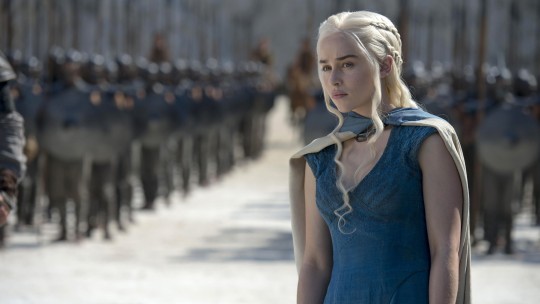
Jessica Pearson (Suits)
Sure, Jessica doesn’t have children of hers but honestly after years of dealing with Mike, Harvey and Louis, are you really going to contend with me on this?
Jessica not only reiterates the point of being the smartest person in the room, she personifies it. She shows that no child is ever too smart, too old or too successful to be put in their place. Something most of us learnt from an early age, but sometimes need reminding. She is always on hand to put out any fire even putting out some before they start. She is also not above letting a fire burn to see how they deal with it.

OG Status: The first Aunt Viv (The Fresh Prince of Bel-Air)
During Janet Hubert’s run as Aunt Viv (Seasons 1-3), the Banks family was blessed with one hell of a matriarch. Smart, funny, woke, stern but approachable. She showcased a side to the black woman/mother that wasn't commonplace on TV at the time. She also perfectly embodied many of our mothers. To this very day, watching any of those episodes, I never fail to see my mother in her. She showed that many mothers, especially MOCs (Mothers of Colours- yeah feel free to make that a thing too) were incredible, strong, complex beings and she quite frankly was a combination of every value I have spoken about in this post.
youtube
I love my mum and will continue to do so for the rest of my life. For anyone who has lost someone as close, you know how difficult it can be. You also know how precious the time you spent with them was. You look back on the memories with such fondness and sometimes it is just enough to get you through the day. What is lasting, as I mentioned earlier, is the impact they have on you. That can never be erased and as much as I wish I could spend another day with my mother, I am eternally grateful for the years I spent with her. I am grateful because she has permanently made me a better person.
So, no need to procrastinate it, go ahead, call your mother and tell her how much she means to you and how much you love her.
But just in case, to all mothers out there, I say a heartfelt thank you.
R.I.P Izevbua Martha Imoukhuede
Bankole Imoukhuede
@banky_I
#mothers#tv moms#jane the virgin#blackish#rainbow johnson#elizabeth mccord#madam secretary#fresh prince of bel air#suits#tv
49 notes
·
View notes
Text
The 2017 Binges you absolutely have to do before 2018

"The Golden Age of Television". That's a saying you've most likely heard as a description of the current state of TV. It has been used from everyone from TV and Studio executives to that your one friend who won't shut up about how great Master of None is. Whatever your feelings about the term, one thing is for certain, there are more quality shows being produced at an almost daily basis than ever before. So many that it seems impossible to follow the TV landscape while, you know, having a life.
That's why I'm here. I've given up my real life so that you can have one and still watch the best TV. You're welcome. Whether it's your FOMO on all the great TV topics or you're just looking for an easy binge for the Christmas break, I’m going to try and provide adequate suggestions to satiate everyone.
The Weekend binges
Mindhunter (Netflix)
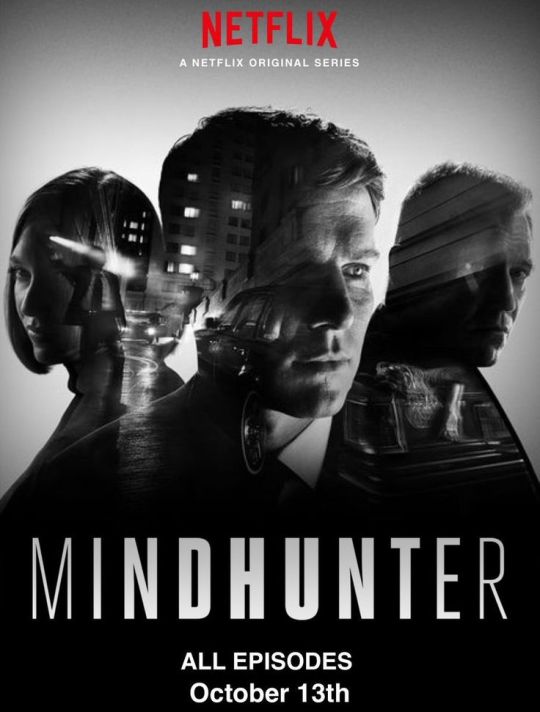
David Fincher's return to Netflix! This show is based on a book by John E. Douglas, a former FBI special agent and a pioneer in criminal profiling in the FBI’s Behavioural Science Unit.
While the protagonists are fictionalised versions of the actual people, the real attraction of the series lies with serial killers and their interviews with the FBI. The criminals do maintain their real names and are depicted to a chillingly high degree of accuracy, in some cases even lifting actual dialogue from the real life interviews.
A terrific examination of the criminal psyche (a feat David Fincher has shown to be a master at), Mindhunter will have you hooked from the first episode.
youtube
You’ll like this if you liked: Zodiac (2007 film), Hannibal, Dexter (probably).
Ozark (Netflix)
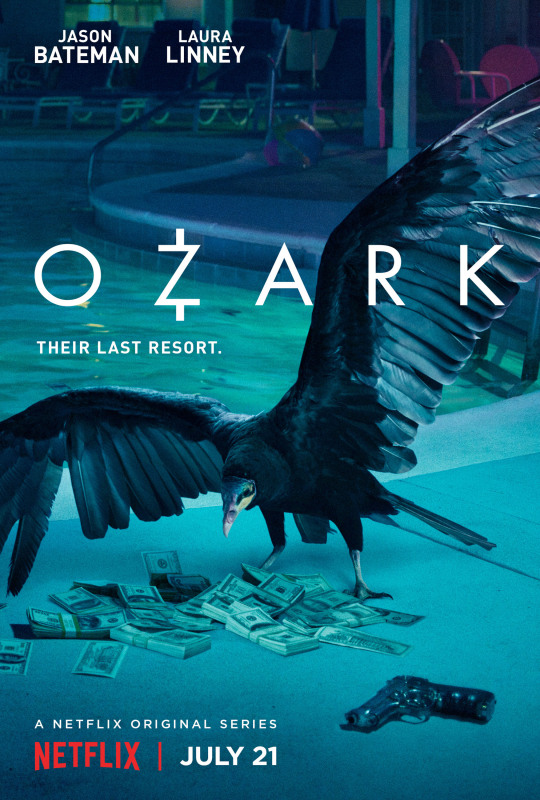
Although dealing with a fairly well trodden premise, Ozark manages to elevate itself from the constraints of its premise and deliver an entertaining, gripping season.
There is no mistake though, this is Jason Bateman’s show to shine and shine he does. Wearing multiple hats as star, producer and director of 4 episodes (probably the show’s best episodes), Jason Bateman delivers a complex and entertaining performance as Marty Byrde, a money launderer for a crime syndicate who is forced to uproot his family and move to the Ozarks in order to pay back a debt to the syndicate.
You might believe you know all the tropes of this sub-genre but Ozark has a few surprises waiting for you.
youtube
You'll like this if you liked: Bloodline, Breaking Bad.
The Niche binges
I believe everyone should love a great dick joke. A perfectly crafted and executed dick joke can be side splittingly funny as is evidenced by the fact that Silicon Valley’s season one's “optimal tip to tip efficiency" joke has seemed to take on a life of its own even spawning research papers with actual Stanford approved maths. I however concede that not everyone is as sophisticated as me, which is why I have put these 2 shows in the “niche” category.
American Vandal (Netflix)
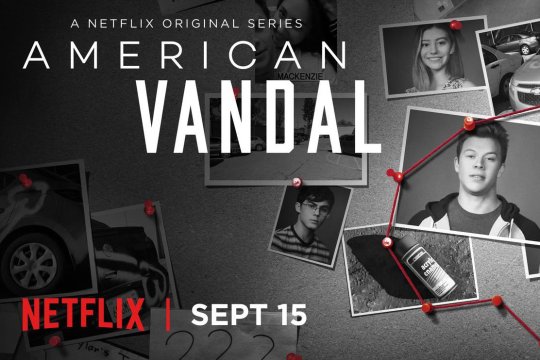
American Vandal is really just an almost 5 hour dick joke at its core. It takes a simple, quite ridiculous, premise- someone spray paints 27 dicks on teachers’ cars in the school parking lot and the accused student is expelled. It is a true crime mockumentary but it doesn’t seek to discredit the genre but rather as all great satire does, it pays it homage.
The characters and the show approach this premise with such straight faced seriousness and investigative attitude that it makes the jokes that much more hilarious. Special mention should be given to Jimmy Tatro whose performance drives the show and who turns the “YouTube douche” personality into an art form.
I did find that, beneath all the dick references, well over 1,000 (both visual and verbal), American Vandal tries to say something and if you pause long enough from laughing and figuring out “Who drew the dicks?” you might just hear it.
youtube
You'll like this if you liked: 7 Days in Hell, Documentary Now!, Making a Murderer (but yearned for something less deep).
Big Mouth (Netflix)

Following the success of the Simpsons, animation quickly became the go to medium for telling deeply perverse and hilarious stories that could never be written for and performed by real people. But the real successes came in the episodes of Simpsons, South Park, Family Guy etc that transcended their "cartoons tell dirty jokes" gimmick and showed some heart and deft in their storytelling. Big Mouth has lots of heart.
With a stellar voice cast which includes co-creator Nick Kroll. John Mulaney, Jordan Peele, Maya Rudolph and Jason Mantzoukas, Big Mouth manages to tell an insightful, universal coming of age, puberty story while also juggling the fact that two of its main cast are "Hormone Monsters" and it has the ghost of Duke Ellington living in a character's attic. (The show is weird, guys)
You'll like this if you liked: Family Guy (the earlier years) and basically any other R-Rated animated comedy.
Trailer
The Snowed-in and cuddle binges
Dear White People (Netflix)

I am a sucker for a good story by and about black people. If such a show manages to deftly attack systemic racism then I'm fully sold. Dear White People however, is more than a guns-blazing attack on racial injustice. Sure, that's the premise by which it starts but as it evolves it begins to say something more on identity, especially Black Identity and all that term entails.
Based on his critically acclaimed film of the same name, Justin Simien manages to improve on his original work in possible every imaginable way. It follows a group of black students at a predominantly white University, as they attempt to negotiate the racial politics and come to terms with their own identities.
You'll like this if you liked: Black-ish and Dear White People (2014 film).
Trailer
The Bold Type (Freeform)
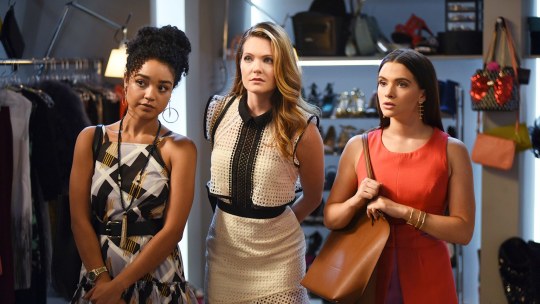
It is no secret that there is a paucity of stories about and driven by female characters and what is even rarer are stories that explore female relationships, especially friendships amongst the younger demographic. Insecure and Jane the Virgin have told some of these stories during their runs and The Bold Type did it incredibly well, under the radar, in 2017.
Through Scarlet, the Teen-vogue like magazine where the protagonists work, The Bold Type manages to address relevant societal issues such as politics, rape, religion and professional ambition while maintaining a "summer-y binge feel to it".
You'll like this if you liked: Ugly Betty, The Devil Wears Prada (2006 film).
Trailer
The Good Fight (CBS All Access)

First of all, for any The Good Wife fan who hasn't seen this already, shame on you. For any non-Good Wife fans though, do not be deterred by the Good Wife link because this show more than ably stands on its own.
Set a year after the finale of TGW, The Good Fight follows the great Diane Lockhart after a financial scam causes her to lose all her savings and she is forced out of her firm. She then joins an all-black law firm that already includes The Good Wife fan favourite Luca Quinn. Rounding off the cast are Sarah Stele (returning as another fan-favourite Marissa Gold), Delroy Lindo, Justin Bartha and Game of Thrones' Rose Leslie.
For Good Wife fans, you don't know how satisfying it is to hear Diane yell "Fuck" until you actually do.
You'll like this if you liked: The Good Wife or any other great legal drama.
Trailer
Obligatory Superhero binge
Legion (FX)
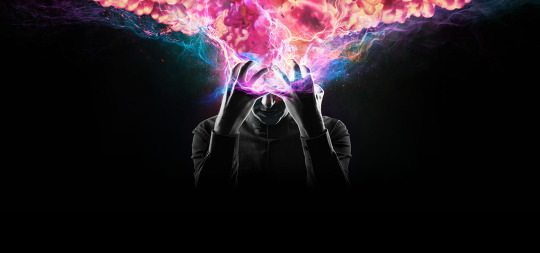
In a year where Superhero TV was littered with messy newcomers such as Iron Fist and Inhumans, Legion was such a breath of fresh air. Rising above the genre of "Superhero TV", it was in my opinion, one of the best new shows of the year.
Noah Hawley (creator of Fargo) examines what would happen if instead of being enlightened as to his mutant powers, a very powerful mutant was diagnosed as having schizophrenia. Legion is the son of Professor Xavier in the comics and excluding a few easter eggs and nods, that is where this show's link to the wider X-men universe ends. It is a show that stands on its own and does not require knowledge of the wider X-men mythology to be enjoyed.
Legion and Noah Hawley are much more interested in diving into an examination of mental illness and the various stereotypes surrounding it than they are in fighting a "big bad". It is a very trippy, colourful and awe-inspiring piece of television that is evident right from its excellent pilot. The performances of Aubrey Plaza and Dan Stevens manage to shine through from a group of wonderful performances.
youtube
Top Picks
There are few things more satisfying to me than a perfectly told, timely story of import. Unfortunately, in the mad dash to tell an "important" story, especially on cable television, good storytelling has often been pushed aside for either pretension or just sloppy work. Their ability to buck this trend was one of the many refreshing things about Big Little Lies and The Handmaid's Tale.
Big Little Lies (HBO)
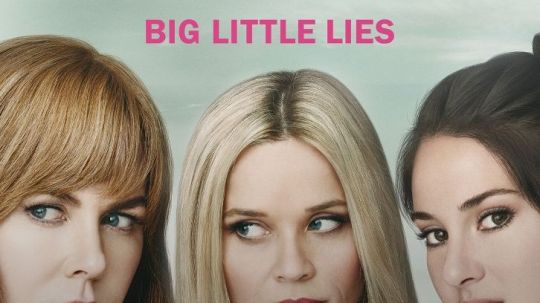
The immediate draw to this series (for the non-book readers) is undoubtedly the cast. This highly stacked cast includes the likes of Nicole Kidman, Reese Witherspoon, Shailene Woodley, Laura Dern, Zoë Kravitz, Alexander Skarsgård and Adam Scott, but once the novelty of the cast wears off, the strength of the story will keep you hooked.
Big Little Lies is a wonderfully well written, directed and acted piece of television that approaches some very heavy and important topics with a delightfully nuanced touch. It says a lot to the strength of the several stories told that the murder mystery at the center of the show, while intriguing in its own right, quickly fades into the background. To give any more details would be to spoil what is a very well done show.
Trailer
The Handmaid's Tale (Hulu)

In The Handmaid's Tale's world, fertility rates have plummeted to almost non-existent numbers. This has resulted in the fertile women being kept as personal breeding grounds for the more affluent member of the cult-like organisation that has taken over society.
The Handmaid's Tale holds many mirrors to our current society but perhaps none is more chilling than the straight path that can be drawn from 45's current America to the "dystopian" society predicted in this 1985(!) novel.
The Handmaid's Tale is built on the Emmy-winning performance of Elisabeth Moss and firmly stands as my best show of 2017 and a definite must watch.
youtube
Bankole Imoukhuede
@banky_I
#tv shows#binge watching#netflix#the handmaids tale#big little lies#legion#the good fight#the bold type#tv#recommendations
12 notes
·
View notes
Text
The Boring Introduction
Welcome to Popcorn for Dinner! My vanity project in which I blindly convince myself that people care about what I have to say and as such will click the links and read what I spew.
For those who may not be familiar with my twitter, I am prone to the occasional rant about anything Film and TV. I aim to use this blog to give those rants a home. To discuss, aimlessly and pointedly, anything and everything from both the silver and small screens. I hope to eventually amass a catalogue of posts that appeal to everyone, from the pop culture neophytes to the the countless fandoms.
I plan on producing a varied range of, predominantly text based, articles. It could be anything from a recommendation piece to an appreciation post, from an article on why you should be watching Agents of Shield to one on how I can't believe you're still watching Empire.
I am also very open to suggestions so if you have a topic you want me to talk about or want an opinion on a piece of pop culture, you can let me know either on here or on twitter. Let’s approach this as an extended twitter thread, and like every great twitter thread I am expecting (hoping for?) my own fair share of trolls.
I am really excited about this, if for nothing else, to be able to expand my pop culture consuming community. So please read, share, retweet, reblog, follow (and any other internet jargon) and let’s begin.
Thanks for indulging me.
Bankole Imoukhuede
@banky_I
2 notes
·
View notes